




ISSUE 1492 NOV 19TH '22 ג"פשת ןושחרמ ה"כ PARSHAT CHAYEI SARA - SHABBAT MEVARCHIM ה"ב OU ISRAEL 02-560-9100 | TorahTidbits.com | ADVERTISING 02- 560-9125 הרש ייח תשרפ YERUSHALAYIM IN/OUT TIMES FOR SHABBAT PARSHAT CHAYEI SARA CANDLES 4:03PM • HAVDALA 5:17PM • RABBEINU TAM 5:55PM Simchat Shmuel Rabbi Sam Shor Program Director, OU Israel Center page 52 ־תא יל־ןתיו הלפכמה תרעמ ט :גכ תישארב Beginning Twice Rabbi Shmuel Goldin Faculty, OU Israel page 20 Remembering Rabbi Sacks zt"l page 58
Photomontage by Josef Tocker, a retired graphic artist now living in Alon Shvut in Gush Etzion. We have been here for almost 13 years, made aliyah in 2010. "Avraham buried his wife Sarah in the cave of the field of Machpelah which is Hebron. This is the first time that we actually paid to have a share in owning Land in Israel and passing it down for an everlasting heritage. I feel by making aliyah, I am continuing that heritage."

2 TORAH TIDBITS 1492 / CHAYEI SARA 5783 Table of Contents
This week's Torah Tidbits cover image!
Shabbat Mevarchim הלילב רשע ירחא םיקלח הנומשו תוקד הנומשו םירשע ישימח לילב היהי ולסכ שדוח דלומ הבוטל לארשי לכ לעו ונילע אבה ישש םויבו ישימח םויב היהי ולסכ שדח שאר Rosh Chodesh Kislev is on Thursday November 24 and Friday November 25 04Dear Torah Tidbits Family Rabbi Avi Berman 08Kiddush Hashem Rabbi Moshe Hauer 10Aliya By Aliya Sedra Summary Rabbi Reuven Tradburks 16To Eulogize and To Weep Rabbi Dr. Tzvi Hersh Weinreb 20Beginning Twice Rabbi Shmuel Goldin 24A Call from the Future Rabbi Lord Jonathan Sacks zt"l 30Probing The Prophets Rabbi
Winkler 32Avraham’s Minimized Grief Rabbi
Rosner 34Perfect Perspective Rebbetzin
Smiles 40OU Israel Schedule 48Holy
Rabbi
52Simchat
Rabbi
Shor 54The
Rabbi
58Remembering
60To
62Why
64Correcting
Rabbi
66When
Buy
68Future
Rabbi
70OU
72The
74Sharing
76Torah 4
By Teens
//
Nachman
Shalom
Shira
Shlepping
Judah Mischel
Shmuel
Sam
Camels
Moshe Taragin
Rabbi Sacks zt’l Benjy Singer
Whom Does the Legacy Belong? Menachem Persoff
‘A Land of Milk and Honey?’ Rabbi Aaron Goldscheider
Praise About Rain
Daniel Mann
Is It Permissible To
Vegetables in the Eighth Year Without Knowing Their Shemitah Status? #1 Rabbi Moshe Bloom
Fertility
Gideon Weitzman
Israel Parenting Column Michal Silverstein
Y- Files Weekly Comic Netanel Epstein
the Positive Sivan Rahav Meir
Teens
Ahava Goldgrab
Shua Golubtchik
Yerushalayim / Maale Adumim 4:03
Aza area (Netivot, S’derot, Et al) 4:21
Beit Shemesh / RBS 4:21
5:15 4:00 5:18 4:18 5:20
5:16 4:19 5:18
5:16 4:16 5:17 Gush Etzion 4:19 5:16 4:16 5:18
OTHER Z'MANIM
JERUSALEM
Ranges 11 days Wed - Shabbat
Nov. 16-26 / 22 Marcheshvan - 2 Kislev
Earliest Tallit and Tefillin 5:15 - 5:23
Sunrise 6:08 - 6:17
Sof Zman Kriat Shema 8:46 - 8:51

Magen Avraham 8:08 - 8:13
Modi’in / Chashmona’im 4:19
Raanana/ Tel Mond/ Herzliya/ K. Saba 4:18 5:16 4:16 5:18
Netanya 4:18
Be’er Sheva 4:21
Rehovot 4:19
Petach Tikva 4:03
Ginot Shomron 4:18
Haifa / Zichron 4:07
Gush Shiloh 4:17
Tel Aviv / Giv’at Shmuel 4:19
Giv’at Ze’ev 4:18
Chevron / Kiryat Arba 4:19
Ashkelon 4:21
5:16 4:16 5:18
5:18 4:18 5:19
5:17 4:17 5:18
5:16 4:00 5:18
5:15 4:15 5:17
5:14 4:04 5:16
5:14 4:15 5:16
5:16 4:17 5:18
5:15 4:15 5:17
5:16 4:16 5:18
5:18 4:18 5:20
5:17 4:17 5:18 Yad Binyamin 4:19
Tzfat / Bik’at HaYarden 4:10
Golan 4:15
5:12 4:07 5:14
5:12 4:12 5:14
Rabbeinu Tam (J'lem) - 5:55PM • next week - 5:53pm
Sof Zman Tefila 9:38 - 9:43 (According to the Gra and Baal HaTanya)
Chatzot (Halachic Noon) 11:23 - 11:26
Mincha Gedola (Earliest Mincha) 11:53 - 11:56
Plag Mincha 3:33 - 3:31
Sunset (Including Elevation) 4:44 - 4:40
Seymour J. Abrams • Ortho dox Union Jerusalem World Center • Avrom Silver Jerusalem College for Adults • Wolinetz Family Shul • Makom BaLev • Birthright • Yachad • NCSY in Israel • JLIC in Israel • Pearl & Harold M. Jacobs ZULA Outreach Center • The Jack Gindi Oraita Program • OU Israel Kashrut
ZVI SAND, PRESIDENT, OU ISRAEL Yitzchak Fund, Former President, OU Israel Rabbi Emanuel Quint z”l, Senior Vice President | Prof. Meni Koslowsky, Vice President
VAAD MEMBERS: Dr. Michael Elman | Stuart Hershkowitz | Moshe Kempinski | Sandy Kestenbaum | Harvey Wolinetz
RABBI AVI BERMAN, EXECUTIVE DIRECTOR, OU ISRAEL
David Katz, CFO, OU Israel | Chaim Pelzner, Director of Programs, OU Israel | Rabbi Sam Shor, Director of Programs, OU Israel Center Rabbi Sholom Gold, Dean, Avrom Silver Jerusalem College for Adults 22 Keren HaYesod <> POB 37015 <> Jerusalem 91370


phone: (02) 560 9100 | fax: (02) 561-7432 email: office@ouisrael.org website: www.ouisrael.org Founders and initial benefactors of the OU Israel Center: George and Ilse Falk a"h
OU Israel, Torah Tidbits does not endorse the political or halachic positions of its editor, columnists or advertisers, nor guarantee the quality of advertised services or products. Nor do we endorse the kashrut of hotels, restaurants, caterers or food products that are advertised in TT (except, of course, those under OU-Israel hashgacha). Any "promises" made in ads are the sole responsibility of the advertisers and not that of OU Israel, the OU Israel Center , Torah Tidbits.
OU ISRAEL CENTER 3
AND HAVDALA TIMES CANDLE LIGHTING OU Kashrut NCSY Jewish Action JLIC NJCD / Yachad / Our Way OU West Coast OU Press Synagogue/Community Services OU Advocacy OU Israel MOISHE BANE, PRESIDENT OF THE ORTHODOX UNION Mitchel Aeder, Chairman of the Board, Orthodox Union | Esther Williams, OU Israel Chair | Gary Torgow, Chair, OU Kashrus Commission RABBI MOSHE HAUER, EXECUTIVE VICE PRESIDENT Rabbi Joshua M. Joseph, Ed.D. Executive Vice President & Chief Operating Officer | Rabbi Dr. Tzvi Hersh Weinreb, Exec. V.P. Emeritus | Shlomo Schwartz, Chief Financial Officer | Lenny Bessler, Chief Human Resources Officer OU KOSHER: Rabbi Menachem Genack, CEO/Rabbinic Administrator OU Kosher | Rabbi Moshe Elefant, COO/Executive Rabbinic Coordinator ISRAEL: Rabbi Yissachar Dov Krakowski, Rabbinic Administrator | Rabbi Ezra Friedman, The Gustave & Carol Jacobs Center for Kashrut Education/Rabbinic Field Representative Headquarters: 40 Rector St. 4th floor, New York, NY 10006 212-563-4000 website: www.ou.org Editor Emeritus: Phil Chernofsky Editor: Rabbi Aaron Goldscheider | aarong@ouisrael.org Advertising: Ita Rochel | 02-5609125 or ttads@ouisrael.org Website: www.torahtidbits.com Not getting enough TTs? Too many? None at all? Contact our DISTRIBUTION 050-577-2111 • ttdist@ouisrael.org
Torah Tidbits and many of the projects of OU Israel are assisted by grants from THE JERUSALEM MUNICIPALITY
TImes According to MyZmanim (20 min. before sundown in most cities, 40 min. in Yerushalyim and Petach Tikva, 30 min. in Tzfat/Haifa)
HAVDALA CHAYEI SARA CANDLES
Candles
TOLDOT
Havdala
5:17
DEAR TORAH TIDBITS FAMILY
RABBI AVI BERMAN Executive Director, OU Israel
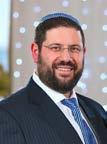
As part of my role as the Director of OU Israel, I reg ularly fly to the East Coast to participate in OU events throughout the year. While any time away from my family is difficult, I am continuously grateful for the experiences I am able to have which allow me to witness the beauty of Am Yisrael wherever I go. I am currently writing to you all from New York where I’ll be for the remainder of the week. What is clear to me is that no matter the distance, Jews always find ways to connect with and learn from one another. I’d like to share some of the highlights I’ve experienced over the last few days. Perhaps they will prove meaningful to you as well.
Kosherfest: As members of Klal Yisrael, our mitzvot have the power to unite us. This past week, more than 6,000 industry profes sionals and 325 exhibitors of kosher-certified products and services joined together at Kosherfest, the world’s largest kosher-cer tified products trade show that brings together businesses large and small - from chain supermarkets, to corner groceries, to food service establishments, to caterers and more.
As the largest global Kashrut agency, OU Kashrut attends Kosherfest every year. For our second year in a row, Rabbi Ezra Fried man, Director of The Gustave and Carol Jacobs Center for Kashrut Education, and I represented OU Israel at the event. Our goal was to connect OU-certified Israeli

importers and manufacturers with those in the US, such as Elad Charazi, the Purchas ing Director of Yochananof and Yossi Strum from Rotem Mitro. Our discussions centered around expanding OU Kashrut certification in Eretz Yisrael and determining how best to import US products. As I found myself running between dozens of meetings set up for us throughout the event, I took a moment to appreciate the thousands of people who have dedicated themselves to upholding the mitzvah of kashrut, gathering together to determine how best to serve the needs of Klal Yisrael on a global scale.
I’ll use this opportunity to thank OU Kashrut’s CEO, Rabbi Menachem Genack, Rabbi Moshe Elefant, COO of OU Kashrut and Phyllis Koegel, Marketing Director for providing a space for so many Jews to gather and support one another. Evident by the meetings that took place, OU certification provides more than just the certification for vendors. Rather, OU certified vendors become part of the global OU Kashrut
4 TORAH TIDBITS 1492 / CHAYEI SARA 5783
network and are given the tools to be suc cessful in their respective roles within the food industry - from promotion, to network ing, to strategizing.





Bnot Sherut in Chutz La’aretz: Among the many elements that make Israel’s National Service model unique, is that young women take time away from their studies to give back to Am Yisrael - even going beyond the borders of Eretz Yisrael. This year, over 115 young women are helping Jewish com munities around the world as an extended year of their National Service. I had the zechut to spend this past Shabbat with 85 of the North American Bnot Sherut who gathered from their posts in Jewish communities spanning the US, Canada and Mexico, at the Young Israel of Teaneck.
We were joined by Reuven Pinsky, Gen eral Director of the National Civic Service and members of his staff, including Orit Lev Ran, who runs all programming for overseas Bnot Sherut. When I addressed the group of young women on Friday night, I felt compelled to acknowledge the opportunity Bnot Sherut in chutz la’aretz are given, to directly impact the development of North American Jewry.
I explained that while every person brings their own talents to their respective National Service positions, by simply growing up in Eretz Yisrael, they have a wealth of knowl edge and experience to offer our brethren in the Diaspora. We can easily take for granted that…
Our children are taught about the chagim when they first enter gan…
Our youth are made aware of the concept of Shabbat, regardless of observance, sim ply by the fact that traffic patterns change
OU ISRAEL CENTER 5
CHANA WAYSMAN SPECIALIST DIETITIAN BFSc&Nutr, MDiet, APD, AN, RD Wolfson Medical Center 9a Diskin St, Rehavia, Jerusalem M 0587 525 916 E chana .waysman@gmail .com W www.slimplicity.wix.com/diet CHANA WAYSMAN SPECIALIST DIETITIAN BFSc&Nutr, MDiet, APD, AN, RD Wolfson Medical Center 9a Diskin St, Rehavia, Jerusalem M 0587 525 916 E chana .waysman@gmail .com W www.slimplicity.wix.com/diet CHANA WAYSMAN SPECIALIST DIETITIAN BFSc&Nutr, MDiet, APD, AN, RD Wolfson Medical Center 9a Diskin St, Rehavia, Jerusalem M 0587 525 916 E chana .waysman@gmail .com W www.slimplicity.wix.com/diet Vered Real Estate Agent FOR SALE IN OLD KATAMON Beautiful spacious renovated penthouse, 210m, 6 rooms, 2 master bedrooms, Sukka balcony of 50m, Shabbat elevator, covered parking, storage room 10,800,000NIS Vered 054 560 4928 Veredly@hotmail.com
before, during and after Shabbat…


Our Egged buses have signs pasted to the front row seats, “Mipnei Seiva Takum,” reminding passengers of the mitzvah to stand before our elders and scholars…
The stories in Tanach come alive through out the country as we gaze out of our windows during our daily travels…
Perhaps what is most palpable when our Bnot Sherut leave the embrace of Eretz Yis rael is the Jewish pride we are raised with that can be lost in chutz la’aretz. Molded by these experiences, our Bnot Sherut are imparting their love for this Holy Land, while connecting Jews of all backgrounds to one another.
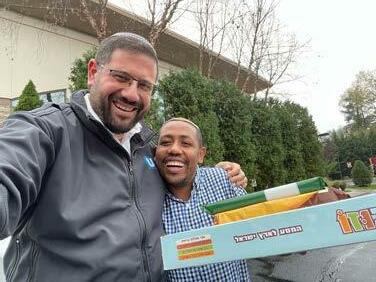
Guzo - The Journey to the Land of Israel: We have so much to learn from one another’s journeys. During my trip I reconnected with my dear friend Aviv Abebe who served as the Director of our OU Israel Youth Center in Rehovot for many years. Just a few years ago, Aviv and his wife moved to New Jer sey on shlichut to serve as educators at Ben Porat Yosef (BPY) yeshiva day school in Para mus, and at the Ahavath Torah Synagogue in Englewood. When Aviv heard about OU Israel’s Guzo game, he asked that I bring as many as possible to the US on my next visit. Originally from Ethiopia, Aviv was particu larly moved by the game and was eager to
share it with his family and students. For those who have yet to experience the game for yourselves, get a glimpse into the rich his tory of Ethiopian Jews. Find out more here: https://www.ouisrael.org/games/ In the coming days I will be attending the
OU International Senior Staff Conference, where I will learn more about the pro grams my colleagues are running around the world. Stay tuned for more on that next week! In the meantime, while I continue to soak in the moments of meaning I’m expe riencing here in New York, I cannot wait to return to our Homeland b’karov. May we continue to find opportunities to connect to one another and appreciate the brachot that surround us here in Eretz Yisrael.
Wishing you all an uplifting and inspiring Shabbat,
6 TORAH TIDBITS 1492 / CHAYEI SARA 5783
A
Rabbi Avi Berman Executive Director, OU Israel aberman@ouisrael.org םילשוריו ןויצ ילבא ראש ךותב םכתא םחני םוקמה
The OU Israel family sends deepfelt condolences to Sara Kriss and family on the passing of her husband
Avraham
Kriss z"l
member and volunteer of the
OU
Israel Center for many years




OU ISRAEL CENTER 7 Brunch Free event for relevant participants. To reserve your place, contact Binyamin Margo at 054-446-5276 Beit Tovei Ha’ir invites you and your friends (70+ and independent) to a sumptuous brunch with Rabbi Dov Lipman, former MK and Director of Yad L’Olim. Mingle with friends at Jerusalem’s premier residence for religious seniors, and tour our new apartments and fitness center. with Dov Lipman at Beit Tovei Hai'r Monday, November 28, 2022 | ולסכ 'ד from 10:00 am | 36 Rehov Malchei Yisrael, Jerusalem
FROM THE DESK OF RABBI MOSHE HAUER

 OU Executive Vice President
OU Executive Vice President
KiddushHashem
A central mandate of the Jewish people is Kiddush Hashem, the sanctification of G-d’s name by making His presence felt in our world. Avraham was the father of our people because he undertook this mandate, dedicating his life to delivering kindness and teaching people about G-d and His goodness, making the G-d of the heavens into the G-d of the earth as well (see Rashi 24:7). His impact was acknowledged by his contemporaries as he was referred to by them as a Nesi Elokim, a G-dly prince (23:5), representing all that is G-dly and good in the world.
The Midrash teaches that Avraham gained this title when he was greeted upon his victorious return from the battle against the four kings at “Emek Shavei hu Emek Hamelech.” It was then and there that the nations unan imously acknowledged Avraham as G-dly royalty (Rashi to 14:17).
What specifically had generated this acknowledgment? They were impressed by Avraham’s loyalty to his estranged nephew Lot, expressed in his readiness to go to bat tle to save his life. They realized as well that Avraham had waged this war against Amraphel/Nimrod, his consistent neme sis who stood for paganism and rebellion against G-d, while Avraham continued to stand for faith in the one G-d. But they also celebrated the phenomenon of one man and
a small fighting force prevailing against the overwhelming power of four regional kings, recognizing that the usual metrics of num bers and physical strength were not decisive when G-d was brought into the equation. They witnessed how the spirit is mightier than the sword.
That same recognition is implicit here in our Parsha. When we read the exchange be tween Avraham and the leaders of Chevron, we recall that this was a city characterized by its population of anakim, people of unusual physical size and strength (Bam idbar 13:22: Yehoshua 14:12). It was these giants who looked at Avraham as the ad am hagadol ba’anakim, the supreme giant amongst them, deferring to him as their Gdly prince (see Rashi to Yehoshua 14:15).
That kind of recognition represents the ultimate kiddush Hashem. In a world domi nated by a variety of forms of material power – physical strength, wealth, prominence, or brilliance – G-d’s presence is felt when those who exemplify His word and values garner the ultimate respect.
“Thus said Hashem: Let not the wise man boast of his wisdom; let not the mighty boast of his might; let not the wealthy boast of his wealth. For only in this may one be praised, in his conscious devotion to Me, for I, Hashem, act with loving-kindness, justice, and righteousness in the world, for it is these things that I desire, declares Hashem.” (Yirmiyahu 9:22-23)
8 TORAH TIDBITS 1492 / CHAYEI SARA 5783











OU ISRAEL CENTER 9 True wholesaler from the diamond boursa with over 25 years experience member diamond dealers club Engagement Rings ∙ Stud Earrings Pendants ∙ Tennis Bracelets 050-573-9061 jeffmor36@gmail.com www.JeffMorDiamondJewelry.com
CHAYEI SARA
ALIYA-BY-ALIYA SEDRA SUMMARY
Rabbi Reuven Tradburks
Director of RCA Israel Region

Our parsha is the transition from Avra ham and Sarah to Yitzchak and Rivka; Sarah dies at the beginning of the par sha, Avraham toward the end. Avraham buys Ma’arat Hamachpela where Sarah is buried. Avraham directs his servant to travel to Avraham’s land to bring a wife for Yitzchak. Upon arrival, the servant asks G-d to show him the right one, the one who will give drink to him and his animals. Rivka appears, does what he had hoped.
He tells the story to her family. They agree that she is the one. Yitzchak greets them on their arrival and marries Rivka. Avraham’s other children are listed. Avraham dies. Yishmael’s descendants are listed.
1st Aliya (23:1-16). Sarah dies at age 127 in Kiryat Arba, Chev ron. Avraham needs to buy a burial plot. He is treated with nobility and respect. The people want to give him a plot, while he insists on purchasing it. He is suc cessful in buying Ma’arat Hamachpela.
Avraham has clearly earned the respect and admiration of the people. He in turn treats them with great respect, bowing twice. The promises made to Avraham, of fame, of fortune and of family, have all been fulfilled. Yitzchak has been born; Avraham is a man of great prominence; the people call him a prince of G-d. And he is wealthy. But. The promise that he would have the land of Israel? He does not even own a burial plot. Fame, fortune and fam ily, yes; foothold in the land, no.
2nd Aliya (23:17-24:9) Sarah is buried. Avraham requests from his chief of staff to swear to not have Yitzchak marry a Canaanite. Rather, “go to my land, my birthplace” to find a wife for Yitzchak. Do not take Yitzchak there. If she refuses to come, you have done all you can.
Yes, Avraham addresses his chief of staff. While we commonly refer to him as Eliezer, his name does not appear in this story. He
10 TORAH TIDBITS 1492 / CHAYEI SARA 5783
KI
TEITZEII
In loving memory of our beloved father and grandfather Joachim Weindling z"l May the Torah learning from this issue be תמשנ יוליעל ל"ז ילתפנ ןב קחצי םייח on his 16th yahrtzeit - ןושח כ Greatly missed by his children and grandchildren Marsha, Melissa, and Becky Pottash Steven and Lizzie Weindling Shoshanah-Ruth, Naftalia Maya, and Yaira Rachel Weindling Nan Abbot and Lee DiTullio Every person who was not born in Israel and lives in the Holy Land should celebrate his/her ALIYANNIVERSARY annually! REMEMBER! WITH ALIYAH BLESSINGS! The NEAMANS
is not the only anonymous person to pro foundly influence the story of the Jewish people. He takes his place alongside the man Joseph will encounter on his way to see his brothers, who steers Joseph in their direction. Both nameless. As if to say: is he finding a wife, or is He finding the wife for Yitzchak? Many messengers has He.
And why is Avraham so insistent on sending his servant to “my land, my birth place”? You cannot help but hear an echo from Lech Lecha – “from your land, from your birthplace” – said to Avraham. It could be that Avraham is seeking a woman to lead the new generation of the Jewish people who will walk in his footsteps. Lit erally. He is seeking a woman who will walk in the footsteps of Sarah. Sarah, not just Avraham, left her land, her birthplace, her family home, journeying to the land of Israel. This new generation will be led by a woman who too leaves her land, her birth place and her parent’s home. Following in the footsteps will animate Yitzchak and Rivka’s life. Yitzchak will do many of the things that Avraham did – digging the wells, going to Gerar. Rivka will walk in the footsteps of Sarah; Sarah sent Yishmael away, Rivka will in effect cause Esav to be sent away from the Jewish people.



but you could possibly do them. For when it comes to communications from G-d, you are unique, irreplaceable, sui generis, one of a kind.


This exchange presents a fundamental principle of the Torah: that G-d speaks to Moshe in a way that He does not, nor will He in the future ever do again with anyone else. When Moshe says that people come to him seeking G-d, what he means is: I have access to G-d. He speaks to me. (Speaking to G-d isn’t the trick; the trick is when He answers back.) Similarly, when Moshe says that he teaches G-d’s law, what he means is that G-d communicates those laws to him and to no one else. This could very well be the prime purpose of this Yitro story. For, in the very next story, the giving of the Torah, the very same theme of Moshe’s uniqueness as the one to whom G-d speaks is central.


3rd aliya (18:24-27) Moshe heard. He chose judges, with only the most difficult cases brought to him. Moshe sent Yitro home. It takes an honest leader to accept suggestions to improve. Moshe displays his honesty and humility – if the suggestion is good, embrace it. Just as Yitro accepted the news of the Exodus and affirmed One G-d,
Malki empowers families of children with special needs in Israel to choose home care. Donations are tax-approved in Israel, US and UK.
Honoring the memory of Malka Chana Roth ד”יה 1985-2001, killed in the Sbarro bombing.

OU ISRAEL CENTER 11
LIVE OPPOSITE THE SEA davidz@AshkelonProperties.com call David at 054-433-2621 www.ashkelonproperties.com Have your cake and eat it too! Beautiful apartments and a as well. sea-view great investment Just 15% down payment! L a r g e s t s e l e c t i o n o f s e a - v i e w A s h k e l o n p r o p e r t i e s f o r s a l e o r r e n t kerenmalki.org 02-567-0602 Keren
MarSea Modest Swim & Casualwear www.MarSeaModest.net (NIS) www.MarSeaModest.com ($USD) Marci Rapp 050-424-8359 THE BEST DESIGN, ENGINEERING AND INSTALLATION OF AIR davidz@AshkelonProperties.com LIVE OPPOSITE THE SEA 0544-332621 “It sounded too good said another happy client to be true – a superb sea-view apartment in Anglo-populated Ashkelon for only 15% down – is actually a reality.” Owning your own apartment does not just allow you freedom, but offers monetary savings, and an increase in your investment value. Anglo-populated, sunny Ashkelon is the answer! It’s very affordable – from $500,000 with just a 15% down payment, mortgages available as well as bank guarantees. Rental income often in excess of 3.5%. המשנ יוליעל and in loving memory of our beloved ל"ז יבצ ןב םהרבא Avraham (Avi) Faier z"l on his second yahrzeit ןושחרמ ו"כ Chaya Faier and Family
3rd Aliya (24:10-26) The servant arrives in Nachor’s city. He asks G-d for a sign; the woman who gives me and my camels to drink, she is the one. Rivka appears and does just that. She tells him she is from the family of Nachor. And there is food for the camels and room for him to stay. The man bows to G-d.
Rivka is not only going to walk in Sar ah’s footsteps, leaving her home to go to the Land of Israel. She also follows in the footsteps of kindness. In the story of Avra ham and Sarah’s generosity to the 3 men at the beginning of Vayera, there are 2 “ratz –run” and 2 “maher – fast”; they served their guests enthusiastically. Rivka has 2 maher’s and 1 ratz here and then another when she runs home. And – Avraham offered his guests “a little water”. Here too the servant asks for “a little water”. Not sure that drawing water for 10 camels would be called a little – but nary a peep of objection from Rivka. She is an enthusiastic and magnanimous woman of generosity, just like the family of Avraham.
4th Aliya (24:27-52) Rivka runs to tell her mother. Her brother Lavan greets the man, wel comes him in. But before he eats, the man insists on relating what just happened. He relates that he is Avraham’s servant. And
that Avraham has been blessed. And is insistent on bringing a wife for Yitzchak from his family. And of his own deal with G-d: that if the woman did as he had said, he would see it as a sign. And his bowing to G-d. He finishes by asking them if Rivka shall join him. They respond yes; he bows to G-d.
Happy endings are fun to read once. Or twice. The commentaries address the detail with which the Torah repeats the story, this time told by the servant. They mine the story for lessons.
But one lesson that jumps out is the G-d talk. There is a lot of G-d talk by this servant. But not just the servant; Lavan and Betuel respond “this has come from G-d”, “she will go as G-d spoke”. Talk of G-d does not seem foreign to them. Perhaps this is the linger ing effect of Avraham’s influence; even after all these years of being away from his family, the influence of his belief in G-d still persists. And the servant, the chief of staff’s language is deeply religious language – he certainly has been profoundly influenced by Avraham’s calling in the name of G-d.
5th Aliya (24:53-67) The servant is ready to leave. When Rivka’s mother and brother ask for a little more time, the servant presses them. They ask Rivka her wish; she will go. They bless her. Upon their arrival in the Negev, Yitzchak comes from Beer L’chai Roi. He sees the camels; she sees him. Yitzchak is told of all that occurred. Yitzchak and Rivka marry.
With the mission to find a wife for Yitzchak successful, someone is missing from this return: Avraham. They travel right to Yitzchak. Rivka and he marry. And
12 TORAH TIDBITS 1492 / CHAYEI SARA 5783
נ"על ןודרוג )ץכ( ןהכה ל-אומש חספ תב הרובד Dora ) Katz( Gordon a"h on her 60th yahrzeit ןושחרמ ט"כ The Gordon Family
Avraham is not heard from again. A true passing of the baton.

Why is it necessary to tell us Yitzchak was in Beer L’chai Roi? In fact, he returns there and resides there after Avraham’s death. Why? That is the place where Yishmael was saved from near death after being ban ished by Sarah. Perhaps Yitzchak regrets Yishmael’s banishment and seeks to make peace with his brother. We will see that he does the same later with his own sons; he seems to want both Yaakov and Esav to continue his legacy. The men seem to want reconciliation; the women see the need to be definitive. Sarah banishes Yishmael. Rivka banishes Esav. Yet, Avraham is reluc tant to send Yishmael away and Yitzchak seeks reconciliation with Yishmael and seeks to bless Esav. The women prevail. The Torah sides with the women; Yitzchak and not Yishmael, Yaakov and not Esav are the forefathers, the bearers of the legacy of Avraham.
6th Aliya (25:1-11) Avraham marries Keturah; they have 6 sons. All that Avra ham has he gives to Yitzchak; these are sent eastward with gifts. Avraham dies at age 175; he is buried by Yitzchak and Yishmael in Ma’arat Hamach pela. Yitzchak is blessed by G-d: he lives in Beer L’chai Roi. The transition from Avraham to Yitzchak is complete. While G-d has been a silent partner in this parsha, here He completes the generational transfer – He blesses Yitzchak. The Jewish people will be Yitzchak and not Yishmael.
blesses Yitzchak. The Jewish people will be Yitzchak and not Yishmael.



tions of Yishmael are enumerated. Yishmael dies. His ous and powerful offspring. The brevity
and began father’s that his icant the
BY RABBI Rav, Beit Knesset
OU ISRAEL CENTER 13
GET A PROFESSIONAL VISION EXAM 02-674-3888 FREE exam with purchase USING THE MOST ADVANCED DIAGNOSTIC EQUIPMENT Multifocal Experts Contact lens fittings Satisfaction guaranteed! • Wide selection of beautiful frames You Deserve a Professional Vision Exam Please call for an appointment Macabi and Meuchedet benefits 12 TORAH TIDBITS 1440 / CHAYEI SARA 5782
When Avraham addresses the people of Cheit, trying to “Ger V’Toshav Anochi Eimachem” (23:4) “A Stranger and This seems to be a contradiction. If one is a stranger than The Magid of Dubno (Jacob ben Wolf Kranz 1741-1804) this tense situation in order to, both, state his truth and be said, on the one hand, “I am a Resident’ due to G-d’s promise need your agreement to purchase a plot. In other words, Avraham “strangers”, while they understood him as saying
The peace was kept, and Avraham remained true to his
the generational transfer – He
that “they”
completes
7th Aliya (25:12-18) The gener ations of Yishmael are enumerated. Yishmael dies. His descendants dwell from Egypt to Assyria.
Yishmael’s story is brief. He has numer ous and powerful offspring. The brevity is to emphasize that the Torah is not as interested in the history of power as in the history of the covenant of G-d with the Jewish people. And that will be told at great length.
HAFTORAH
1 MELACHIM 1: 1-31
The theme of this week’s haftorah echoes the theme in our parsha which mentions both the death of Sarah and Avraham.
King David was an older man and a woman was assigned to him to serve him and provide warmth.
Adoniyahu, one of King David’s sons, began to prepare for ascension to his father’s throne. This was despite the fact that King David expressed his wishes that his son Shlomo succeed him.
Adoniyahu convinces two very signif icant personalities - the High Priest and the commander of King David’s armies - to champion his cause.
Adoniyahu arranged to be transported in a chariot with fifty people running before him. He then invited supporters to a festive party to promote his aspirations to attain the royalty.
At this time Natan communicates with Bat Sheva, mother of Shlomo, and conveyed to her the importance of approaching King May the Torah learned from this TT be נ"על and in loving memory of our dear brother
Zvi (Howard) Rosner
A SHORT VORT
BY RABBI CHANOCH YERES R av, Beit Knesset Beit Yisrael, Yemin Moshe
After Sarah’s death, Avraham felt the urge to find a wife for his son Yitzchak. Avraham appoints Eliezer, his servant to complete the task of finding a suitable mate for Yitzchak. He tells him where to look for her but then adds:
“And you shall take a wife for my son, for Yitzchak” (24:4) (ד:דכ) “קחציל
Rabbi Shimshon Rafael Hirsch seems to ponder why Avraham needs to give such detailed instructions. If he is asking him to find a wife for “his son”, is it not obvious that he was referring to Yitzchak? What was Avraham referring to when he emphasized “for Yitzchak?
He answers that there were two issues Avraham was instructing Eliezer. Firstly, “for my son”- we must feel that she should be worthy to become my daughter as much as he is my son. Furthermore, the prospective bride and Yitzchak must also be suitable for each other. Therefore, “for Yitzchak” means that she connects with Yitzchak’s personality, a modest, innocent girl for his son, who would bless his home with fine feelings and morals.
Shabbat Shalom
14 TORAH TIDBITS 1492 / CHAYEI SARA 5783
ינבל השא תחקלו”
ל"ז א"פשת ןושחרמ ב"כ ע"בלנ Nechama
Dedicated L’iluy Nishmat ה"ע ןהכה קחצי 'ר תב היח Helen Schiffmiller a”h whose 4th Yahrtzeit is on ןושחרמ ו"כ
Rabbi
and Elliot Rosner
David and pleading with him that he artic ulate his choice of Shlomo to be the next King.
King David responds positively to this request. He says the following: “Indeed, as I swore to you by the Lord God of Israel say ing, ‘Surely Shlomo, your son, shall reign after me and he shall sit on my throne in my stead, surely, so will I swear this day.”


STATS



5th of the 54 sedras; 5th of 12 in B’reishit
Written on 171 lines in a Torah, rank 37 4 Parshiyot; 3 open, 1 closed 105 p’sukim - ranks 32 (11 in B’reishit) 1402 words - ranks 37th (11 in B’reishit) 5314 letters - ranks 36th (11 in B’reishit)
MITZVOT

None of the 613 mitzvot are in Chayei Sara, however, as we mention often, there are Midot and values and other lessons to be learned. This is one of 17 mitzva-less sedras, 9 of which are in Sefer B’reishit, 3 in Sh’mot, none in Vayikra, 2 in Bamidbar, and 3 in D’varim.
and our next step will be to plant a fruit tree. I never thought of myself as being the agricultural type, but the feeling of settling and planting a portion of Eretz Yisrael, has been truly euphoric. Iy”H, when we plant our tree, and eat the fruits that will grow one day, I think we will be able to truly appreciate that unique Kedusha found in
To conclude, when you buy your Tu B'shvat fruit this year, don’t search for those dried apricots and banana chips imported from Turkey. Rather, head over to the fresh produce and buy yourself some nice juicy Kedusha-filled Jaffa oranges and thank in , imbibing that Kedusha in every bite that
OU ISRAEL CENTER 15
Liaise with tax professionals in Israel and the US to assist in tax filing and record keeping Ensuring financial health by organizing and streamlining finances to safeguard your assets We think of everything, so you don’t have to File management, bill payment and bank reconciliations Tracking and monitoring income, expenses and investments
THE PERSON IN THE PARSHA
BY RABBI DR. TZVI HERSH WEINREB OU Executive Vice President, Emeritus
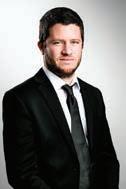


To Eulogize and To Weep
Kindergarten children are delightfully oblivious to the distinction between what adults call reality and the imaginary world. For these young children, there is no difference between the people in their actual lives and the people they learn about in the stories they hear.
For most adults, the heroes of the Bible stories are historical figures, and although they exist in our imagination, we know that they are long gone. These heroes and hero ines, however, are as real to kindergartners as their parents and siblings are.
This hit home with me many years ago when my oldest daughter was a kin dergarten student. She is now herself a grandmother, so that tells you just how long ago this was.
As all children in a Jewish religious
kindergarten, by this time of year she had heard many stories about Sarah. She knew about Sarah’s journey to the Promised Land, of her trials and tribulations in Egypt, of the fact that she was barren, and of the joy she experienced with the birth of Isaac.
On the Friday before the Shabbat of this week’s Torah portion, Chaye Sarah, she came home from school distraught, with tears flowing down her little cheeks. “Mommy, daddy,” she cried. “Did you hear? Sarah died, Sarah died!” She was in the grips of a sadness very close to real grief; for Sarah had become a living figure for her, much to the credit of the teacher who told her Sarah’s story. Few of us adults will exhibit emotion this week as we read of Sarah’s demise. But I wager there are numerous kindergarten age boys and girls in Jewish schools who will shed tears.
For those of us who study the Torah portion weekly, death and dying are not unfamiliar. From the first human being who died, ironically through murder, until
16 TORAH TIDBITS 1492 / CHAYEI SARA 5783
been memorialized in a popular song, "An eternal people does not fear the long and arduous path."
be in loving memory and נ"על our dear parents whose yahrtzeits are in Kislev
Doris Weinberger a"h



ולסכ 'ד -ה"ע המלש לאקזחי תב האל הרובד
the near death of Isaac of which we read last week, the Bible has reported dozens of deaths to us.
Max Weinberger z”l
ולסכ ז"כ -ל"ז בד ןב ךלמילא
Greatly missed by their children, grandchildren and great grandchildren
Patience is necessary for those who follow Isaac's way. But a wise woman taught us that patience is but another name for hope. That woman was Jane Austen, who put these words into the mouth of one of the characters in her great novel, Sense and Sensibility: "Know your own happiness. You want nothing but patience—or give it a more fascinating name: call it hope."
But there is something especially poignant and moving about Sarah’s death, even to us jaded adults. This is partly because, for the first time in the Bible, we have the report of another person’s reaction to the death of a loved one. We read of a bereaved Abraham, a loving husband who comes “to eulogize Sarah and to cry for her.” (Genesis 23:2)
Rav Aryeh and Dvora Weinberger Bernie and Leah Weinberger Menachem and Hannah Katten
For the first time, we learn of the human capacity to express emotions through eulogy.
In observance of the Shloshim of our friend Yehuda Leib Berren z"l
Rav Menachem Weinberg will give a shiur in his memory "Heroic Joy"
The Talmud has a fascinating discussion over the nature of eulogy, of hesped. “Is a eulogy designed to benefit the dead?” asks the Talmud. “Or is it for the benefit of the living survivors, the mourners?”
Monday evening, 23 November/ 8 Kislev 7:30pm Zoom Meeting: 853 8980 1519 Password: Yehuda

The Talmud has its own conclusion, but there can be no doubt that from a psychological perspective the eulogy does both. It honors the dead, and it provides the mourner with the opportunity to give vent to his grief and to achieve a degree of catharsis.
Perhaps this is why Abraham both “eulo gizes” Sarah and “cries for her”. In his “eulogy” he honors her person, her charac ter, her achievements in life. By “crying for her,” he gives voice to his profound sense of the loss of his life’s partner.
I can never forget the powerful experi ence I had long ago in a workshop led by the famed psychologist, Virginia Satir. She asked us to each retreat to a private corner
OU ISRAEL CENTER 17
OU ISRAEL CENTER 15
SEALING SERVICES
052-385-9944 • 054-499-9043
SEALING SERVICES AND ROOFING Your Jewelry is Worth Gold! @Fancycolors vmkdiamonds.com vmk_diamonds Jewelry Manufacturer Upgrade your old Jewelry piece to a new modern design Best rate for broken and old gold pieces, inheritances Service in Hebrew | English | French | Italian Safe & Convenient Member of the Israel Diamond Exchange & the World Federation since 1997 Pay Cash 054-397-7707 Mishael Vardi
of the large room and to devote a quiet hour to meditate upon, and if we wished, to record in writing, the eulogy that we imag ine would be written for us when we died. I remember silently adding to those instruc tions the words “...after 120 years.”

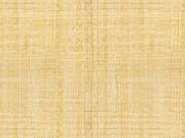




This exercise forced us to look deeply within ourselves and to determine what was permanent and worthy in our lives, and how we wished to be remembered by others. After a few moments into the exercise, the initial silence was broken by sobs, by sighs, by weeping. After that hour, the group gath ered and many shared extremely moving feelings, and reported much self-discovery and self-revelation.

I don’t recommend this experience to you, dear reader, unless you can do so in the presence of a trusted friend, preferably a person trained in coping with the feelings that can possibly emerge from such an exercise. But I do draw upon the experience I had that day to understand what others go through in the inevitable process of grief and mourning. I do continually go back in my memory to that day to understand myself and to evaluate my own life and its successes and failures, accomplishments and frustrations.
And I do rely upon the reactions I wit nessed and personally underwent that day to understand our patriarch Abraham and his need to both “eulogize Sarah, AND to cry for her.”

18 TORAH TIDBITS 1492 / CHAYEI SARA 5783
+972-52-595-5492 H illel M end lowitz A family business with over 40 yearsof experience in the US and Israel Real Estate Acquisitions Interior Design Property Management Renovation Construction ALL YOUR JERUSALEM REAL ESTATE SERVICES UNDER ONE ROOF! ErusalEm HomEs
Mazal Tov to Arlene Saslow and family on the engagement of her grandson Davidi Wimpfheimer to Ashira Baumol daughter of Rabbi Avi & Hadley Baumol


OU ISRAEL CENTER 19 At the hod denya retirement residence, you will find new friends, social events, workshops, lessons, trips, a pool, a salt room and a gym. This is the time to fulfill your dreams and live as you've always dreamed, surrounded by beloved friends and family members. OCCUPANCY SOON! ITS ABOUT PEOPLE An Apartment in Your Name in the Land Registry | No Deposit | No Erosion Hod Denya JerusalemAssistedLiving For details and registratio: 02-5001177 21 Golomb St., Jerusalem | Find Hod Denya on www.hoddenya.com BLACK FRIDAY until the end of November at Hod Denya. Buy an apartment and receive your appliances for free!
B'CHODSHO
Beginning Twice
I invite you to step back for a moment- in the middle of the Torah’s description of our earliest years- to consider a fundamental question: Why does Jewish history begin twice?
Our story first began, in Parshat Lech Lecha, with the opening of a pre-na tional period, the Patriarchal/Matriarchal Era. Launched by Avraham’s journey to Canaan, this period comes to an end in Par shat Vayechi, with Yaakov’s death.
But, then, our story begins all over again. We open the Book of Shmot, and read of the birth of the Jewish nation – of a journey that will take us from the cauldron of slav ery, through the wrenching Exodus, to the dramatic Revelation at Sinai.
Why is all this necessary? Why is a
BY RABBI SHMUEL GOLDIN Faculty, OU Israel Rabbi Emeritus, Congregation Ahavath Torah, Englewood NJ
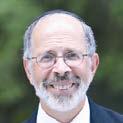
pre-national period so critical to our people’s development? Why doesn’t our story begin, as the first Rashi on Bereishit sug gests, with the birth of the Israelite nation?
On one level, this question is clearly rhe torical. This week’s issue of Torah Tidbits, like all other issues, records numerous powerful lessons conveyed by the actions of the Patriarchs and Matriarchs. The Torah would be incomplete without these, and the innumerable other lessons taught by our ancestors; as relevant for us today as they were on the day the events occurred.
And yet, I have always thought that there is something more – something to be learned not only from the specific stories of the patriarchs and matriarchs but from the very existence of this introductory period itself. Over the years I have identified three global foundations, essential to our national character, that are laid during the patriarchal/matriarchal era. I believe that these underpinnings serve as the best argu ments of all for the inclusion of this seminal period in the record of Jewish history.
1. The patriarchal/matriarchal era estab lishes the significance of the yachid (the individual).
God wanted there to be a time when the totality of our people’s experience would be defined by the lives and dreams of individuals: Avraham, Sara, Yitzchak, Rivka, Yaakov, Rachel and Leah. Their stories
20 TORAH TIDBITS 1492 / CHAYEI SARA 5783
May the learning from this issue of Torah Tidbits be in loving memory of our father, grandfather, great-grandfather Alfred S. Cohen ל"ז ל"ז ןהכה ןורהא םולש אבא on her 14th yahrzeit - ןושחרמ ד"כ by his daughters: Janice Weinreb, Barbara Yasgur, Benay Cohen-Nesher and families
MIDEI CHODESH
would serve to remind us, even after the dawn of the national era, of the continuing, inestimable importance of each individual.
Generations before Avraham begins his journey, the Torah records the stories of two failed civilizations. Personal greed dooms the generation of the flood, while societal tyranny seals the fate of the build ers of the Tower of Bavel. In the aftermath of these two catastrophic failures, HaShem commands Avraham and his descendants to model righteousness for the world. To fulfill this task, they will need to strike a healthy balance between individual and community.
With the birth of Jewish nationhood, the newly established tzibur (commu nity) could not be allowed to overwhelm the individual or stifle individuality. Our nation’s birth, therefore, had to wait until the patriarchal/matriarchal period fully established the importance of each per son’s unique contribution to the communal fabric.
2. The patriarchal/matriarchal era estab lishes the primacy of the Jewish family and home.
In a very real sense, this introductory period of Jewish history can be seen as a journey towards one specific moment, the moment when Yaakov lies on his death bed surrounded by his children. Unlike Avraham and Yitzchak, each of whom had progeny who were lost to Jewish history,
Eiferman Properties Ltd.
VISIT OUR NEW WEBSITE www.eifermanrealty.com
JERUSALEM SALES
EXCITING PROJECTS, BUILDINGS: Presales, Under Construction, Ready to Move In. Buildings and Villas w/building rights + permits Call for more information
OLD KATAMON
* In a small building, 125 sqm, private entrance, 3 exposures, Excellent potential, NIS 4,300,000!
* 5 Bdrms, 135 sqm spacious duplex, succah, private elevator.
OLD CITY Magnicent 8+ room home with view to Har Habayit!
HAR NOF
* NEW ON MARKET!
Centrally located! 4.5 rooms, low oor, elevator, MB en suite, succah, machsan, Immediate
* Shlav A - 170 sqm duplex garden apt. , open view!
* Shlav A - 4 bdrms, renovated, spacious LR DR, succah
* Shlav B - 200 sqm garden duplex apartment, beautiful kitchen, wrap around garden.
02-651-4030 FOR MANY MORE PROPERTIES:

OU ISRAEL CENTER 21
MASSAGE THERAPIST & FITNESS TRAINER 052.673.3704 I www.andyhealth.com | jerusalemmyhome@hotmail.com TUVIA ANDY HAAS BALANCE and FALL-PREVENTION SPECIALIST for OLDER ADULTS Maintain Healthy Bones and Muscles Decrease Stiffness and Joint Pain Increase Strength! Stay Independent!
Yaakov now knows that all of his children intend to follow in his ways. After three generations of struggle with outside influ ences and internal turmoil, the Hebrew family is finally whole. The patriarchal era can now safely end.
The journey of the patriarchal house holds to that moment teaches us that: before we could become a nation, we had to be a family.
The significance of the home is under scored again when God delivers His preparatory instructions to Moshe at Sinai: “Thus shall you say to the House of Yaakov and speak to the People of Yisrael…” Do not assume that, since you are now the “People of Yisrael,” you can, therefore, set the “House of Yaakov” aside. The family unit remains of primary importance.
The Jewish home is and always has been the single most important educational unit in the perpetuation of our people. What our children learn at home, through exam ple and word, shapes both their knowledge of and their attitude towards Jewish tradi tion and practice. The home’s centrality finds its roots in the earliest moments of our people’s story, in the journey of the patriarchal families, centuries before our nation is created.
3. The patriarchal/matriarchal era estab lishes a preexisting national legacy.
The value of our possessions, whether material or spiritual, increases exponen tially when those possessions are perceived as a legacy from previous generations. A beautiful pearl necklace is infinitely more precious if it is an heirloom which belonged to a beloved mother or grandmother. Because of the patriarchal/matriarchal
era, our nation is born with a preexisting legacy. By the time the Exodus and Reve lation launch the national era, we already possess a history. Our dreams reflect the dreams of our forefathers and our goals represent the fulfillment of their hopes. The Land of Israel is not an unknown des tination, but a cherished Land of which we have already heard countless tales, a Land promised to our ancestors centuries before. The Torah and its commandments are not foreign concepts, but the expected realization of covenants already contracted between God and those who preceded us.
The phenomenon of a pre-existing legacy lends a richness and depth to the moment of our nation’s birth that could not have been created in any other way. Even more, however, this phenomenon sets the ini tial paradigm for the ongoing process of mesora, the transmission of tradition from one generation to the next. From the very beginning, our mission is personal, a mis sion shaped not only by God’s will but also by the memories of people and ages gone by. Those warm memories, together with countless others created across the years, form the ever-growing human dimension of our heritage, a dimension essential to the mesora process, a dimension originating in the patriarchal/matriarchal era.
Three critical, pre-existing foundations shape our nation’s character from the moment of its birth. Perhaps that is why, with inestimable wisdom, God provides us with a history that begins twice.
Rabbi Goldin is the author of the OU Press volumes “Unlocking the Torah Text,” and “Unlocking the Haggada."
22 TORAH TIDBITS 1492 / CHAYEI SARA 5783
)ז"י ,ג"כ












And so the field of Ephron which was in Machpelah, facing Mamre, was established (as Abraham's possession). [This included] the field and the cave that was in it, and all the trees that were in the field, which were within its entire border around." (Genesis 23,17) Sha'Arei Tora Street, Bayit Vegan. Garden apartment (240 Sqm, 360 garden), 7 bedrooms, 4 bathrooms, U/F heat, A\C, Large mehadrin Kitchen , sauna, jacuzzi, parking, storage. NIS 11,800,000 Ezra Levy 054 842 1289
A rare apartment in the luxurious Pninat Chemed project. 5 rms (153sqm), Sukkah balcony with a breathtaking view. Asking price NIS 7,290,000 Malki Carasso 053-548-7161



NIS 3,580,000 flex Rachel Gluck 052-478-9193

Authentic
Orna Even 054-621-6069


Rechavia Garden Duplex

Spacious garden apt. 400 Sqm on two floors+ 200 Sqm wraparound garden. Can separate into two units. 2 indoor parking spaces. Handicapped access . Elevator.
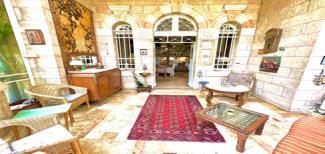
Orna Even 054 621 6069
Newly renovated, 4 bedrooms, 3 full baths,150 sqm, large balcony with amazing view, U/F heating, central a/c, elevator, parking. NIS 6,465,000

Ariyel Maresky 072 392 2109

OU ISRAEL CENTER 23 םָקָּ֣ ָיַו ה ָרָעְׂמַהְׂו ֙הֶדָשַה אֵֵּ֑רְׂמַמ י ֵּנְׂפִל רֶֶׁ֖שֲא הָָ֔לֵּפְׂכַמַב ֙רֶשֲא ןוֹ֗רְׂפֶע ה ֵּדְׂש | ביִִֽבָס וֶֹׁ֖לֻבְׂג־לָכְׂב רֶֶׁ֥שֲא הֶָ֔דָשַב ר ֶשֲא ֙ץֵּעָה־לָכְׂו
וָֹ֔ב־רֶשֲא :
,הרש ייח,תישארב( "
Tkhelet Mordechai St 21, Romema
Baka
Magnificent Old Arab
Garden Home
home, 4m ceilings, arches, 4 rms (120 sqm ) +huge private garden ( 300 sqm) + 60 sqm building rights, Private parking NIS 9,800,000 Alyssa Friedland 054 668 4111
Adam St 33, Armon Hanetziv/Arnona 2 min from Arnona! 173 m corner cottage! 7 rooms, 53 m balcony, fab view! Great for family 7 steps to door! NIS 4,900,000 flex Rachel Gluck 052-478 9193
Yael St, Baka Penthouse
Architecturally designed, beautiful penthouse apt, 5 rooms, 3 bathrooms, Succah, parking, storage. Perfect for a family- ready to move in. NIS 6,400,000
Beit Nekofa, Private Estate
historic house, 5 room, fully accessible Over 1.5 dunam land. Possibility to build second house on the lot Handicap accessible Asking NIS 9,250,000 Nelly Ephrati Artom 052 476 4356
Elkachi 36, Armon Hanetziv
Minutes from Arnona! 5 Rm Renovated duplex w/ roof balcony & views! 3 steps to front door!
Horkania Penthouse, Katamon/Rasco
The largest collection of exclusive Jerusalem properties is just one search away www.remaxjerusalem.com
COVENANT & CONVERSATION
Thoughts
A Call From the Future
He was 137 years old. He had been through two traumatic events involving the people most precious to him in the world. The first involved the son for whom he had waited for a lifetime, Isaac. He and Sarah had given up hope, yet God told them both that they would have a son together, and it would be he who would continue the covenant. The years passed. Sarah did not conceive. She had grown old, yet God still insisted they would have a child.
Eventually it came. There was rejoicing. Sarah said: “God has brought me laugh ter, and everyone who hears about this will laugh with me.” (Gen. 21:6) Then came the terrifying moment when God said to Abraham: “Take your son, your only one, the one you love... and offer him as a sacri fice.” (Gen. 21:6) Abraham did not dissent, protest or delay. Father and son travelled together, and only at the last moment did the
command come from heaven saying, “Stop!” How does a father, let alone a son, survive a trauma like that?
Then came grief. Sarah, Abraham’s beloved wife, died. She had been his con stant companion, sharing the journey with him as they left behind all they knew; their land, their birthplace, and their families. Twice she saved Abraham’s life by pretend ing to be his sister.
What does a man of 137 do – the Torah calls him “old and advanced in years” (Gen. 24:1) – after such a trauma and such a bereavement? We would not be surprised to find that he spent the rest of his days in sadness and memory. He had done what God had asked of him. Yet he could hardly say that God’s promises had been fulfilled. Seven times he had been promised the land of Canaan, yet when Sarah died he owned not one square inch of it, not even a place in which to bury his wife. God had promised him many children, a great nation, many nations, as many as the grains of sand in the seashore and the stars in the sky. Yet he had only one son of the covenant, Isaac, whom he had almost lost, and who was still unmar ried at the age of thirty-seven. Abraham had every reason to sit and grieve.
Yet he did not. In one of the most extraor dinary sequences of words in the Torah, his

24 TORAH TIDBITS 1492 / CHAYEI SARA 5783
תומשנ יוליעל ה״ע זייא דוד לארשי תב הדלוגו רשא בקעי ןב סחנפ ה״ע רטרש קחצי תב הינעמו בייל הירא ןב לאירזע
on the Weekly Parsha from RABBI LORD JONATHAN SACKS ZT"L Former Chief Rabbi of the United Hebrew Congregations of the Commonwealth
May the learning of these Divrei Torah be תמשנ יוליעל HaRav Ya'akov Zvi ben David Arieh zt"l
grief is described in a mere five Hebrew words: in English, “Abraham came to mourn for Sarah and to weep for her.” (Gen. 23:2) Then immediately we read, “And Abra ham rose from his grief.” From then on, he engaged in a flurry of activity with two aims in mind: first to buy a plot of land in which to bury Sarah, second to find a wife for his son. Note that these correspond precisely to the two Divine blessings: of land and descendants. Abraham did not wait for God to act. He understood one of the profoundest truths of Judaism: that God is waiting for us to act.
How did Abraham overcome the trauma and the grief? How do you survive almost losing your child and actually losing your life-partner, and still have the energy to keep going? What gave Abraham his resilience, his ability to survive, his spirit intact?

I learned the answer from the people who became my mentors in moral cour age, namely the Holocaust survivors I had the privilege to know. How, I wondered, did they keep going, knowing what they knew, seeing what they saw? We know that the British and American soldiers who liberated the camps never forgot what they witnessed. According to Niall Fergusson’s new biography of Henry Kissinger,1 who entered the camps as an American soldier, the sight that met his eyes transformed his life. If this was true of those who merely saw Bergen-Belsen and the other camps, how almost infinitely more so, those who lived there and saw so many die there. Yet the sur vivors I knew had the most tenacious hold
1 Niall Fergusson, Kissinger: 1923–1968: The Idealist (London: Penguin Books, 2015).
OU ISRAEL CENTER 25
on life. I wanted to understand how they kept going.
Eventually I discovered. Most of them did not talk about the past, even to their marriage partners, even to their children. Instead they set about creating a new life in a new land. They learned its language and customs. They found work. They built careers. They married and had children. Having lost their own families, the survi vors became an extended family to one another. They looked forward, not back. First they built a future. Only then – some times forty or fifty years later – did they speak about the past. That was when they told their story, first to their families, then to the world. First you have to build a future. Only then can you mourn the past.
Two people in the Torah looked back, one explicitly, the other by implication. Noah, the most righteous man of his generation, ended his life by making wine and becom ing drunk. The Torah does not say why, but we can guess. He had lost an entire world. While he and his family were safe on board the ark, everyone else – all his contempo raries – had drowned. It is not hard to imagine this righteous man overwhelmed by grief as he replayed in his mind all that had happened, wondering whether he
might have done something to save more lives or avert the catastrophe.
Lot’s wife, against the instruction of the angels, actually did look back as the cities of the plain disappeared under fire and brimstone and the anger of God. Immedi ately she was turned into a pillar of salt, the Torah’s graphic description of a woman so overwhelmed by shock and grief as to be unable to move on.
It is the background of these two stories that helps us understand Abraham after the death of Sarah. He set the precedent: first build the future, and only then can you mourn the past. If you reverse the order, you will be held captive by the past. You will be unable to move on. You will become like Lot’s wife.
Religious Caregiver


Something of this deep truth drove the work of one of the most remarkable survi vors of the Holocaust, the psychotherapist Viktor Frankl. Frankl lived through Aus chwitz, dedicating himself to giving other prisoners the will to live. He tells the story in several books, most famously in Man’s Search for Meaning. 2 He did this by finding for each of them a task that was calling to them, something they had not yet done but that only they could do. In effect, he gave them a future. This allowed them to sur vive the present and turn their minds away from the past.
Frankl lived his teachings. After the lib eration of Auschwitz he built a school of psychotherapy called Logotherapy, based
2 Viktor E. Frankl, Man’s Search for Meaning: An Introduction to Logotherapy, translated by Ilse Lasch (Boston: Beacon Press, 1992).
26 TORAH TIDBITS 1492 / CHAYEI SARA 5783
Car owner
New apt for sale in BAKA 113 sqm with terrace 6.8 sqm. Shabbat elevator 4,700,000 NIS




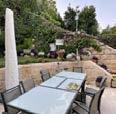
Yemin Moshe beautiful property over 300 sqm. 2 private entrances (complete separate unit over 90 sqm). large garden. Close to parking and gorgeous architectural design newly renovated. Call for more info


In the heart of BAKA enclosed in a magical courtyard: 3 bedrooms 2 full bathrooms one flight up. Beautiful spacious sukka terrace facing open gardens. Completely renovated with architectual design and high level finishes. Price 6,250,000 NIS






BAKA Penthouse. 154 sqm on one floor with 4 bedrooms and 2 full bathrooms. Shabbat elevator, 2 underground parking and 3 storage units!!! 25 sqm Sukka terrace off living room plus large roof top terrace. 6,650,000 NIS
Private home in BAKA. 650 sqm of land, private gated property, arab styled old house that was completely restored. Huge front garden. Building rights. Actual living space >450 sqm plus basement. Call me if you are looking for a special property.
GERMAN COLONY 145 sqm apartment. Duplex unit that is 1/3 of a private Templar house. Large salon/ dining/kitchen (open floor plan), 4 bedrooms (2 ensuite on main floor, 2 upstairs), study, 3.5 bathrooms. The house is in Tabu, with a private garden of 135 sqm. Price: 11,000,000 NIS
Eta Morris Realty, Ltd. etamorrisrealestate@gmail.com Eta: 054-723-3863 · Rachel: 052-546-6425 etamorrisrealty.co.il
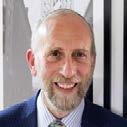
CROSSROADS PRESENTS:
This workshop will be divided into separate sessions designated for Yeshivot and Seminary professionals. The Workshop will provide a more in-depth understanding of developmentally appropriate sexuality for this age group and offer help in how to respond supportively to students regarding issues of sexuality. There will be a presentation and opportunity for questions and discussion.
Workshop Facilitator: Dr. David Ribner, Chairman of the Sex Therapy Training program-Continuing Education Unit, Bar Ilan.
Coming Soon… Crossroads Efrat! www.crossroadsjerusalem.org
OU ISRAEL CENTER 27
“How
Do We Create a Healthy & Effective Dialogue about Sexuality with Gap Year Yeshivot & Seminaries” A Workshop for Jewish Studies Program Professionals
Tuesday, December 6th Location: Yaffo 34, Jerusalem at Crossroads Clinic & Center To RSVP and more information, contact: Mira at 02-624-6265 / mira@crossroadsjerusalem.org
3:30-4:45 PM Male staff of Yeshivot & Religous Men’s Programs 2:00-3:15 PM Female staff of Seminaries & Religous Women’s Programs
Jerusalem Real Estate is My Business Eta: 054-723-3863 Rachel: 052-546-6425 Amazing stand alone homes in OLD KATAMON, TALBIYA, BAKA, GERMAN COLONY
on the human search for meaning. It was almost an inversion of the work of Freud. Freudian psychoanalysis had encouraged people to think about their very early past. Frankl taught people to build a future, or more precisely, to hear the future calling to them. Like Abraham, Frankl lived a long and good life, gaining worldwide recogni tion and dying at the age of ninety-two.
Abraham heard the future calling to him. Sarah had died. Isaac was unmarried. Abra ham had neither land nor grandchildren. He did not cry out, in anger or anguish, to God. Instead, he heard the still, small voice saying: The next step depends on you. You must create a future that I will fill with My spirit. That is how Abraham survived the shock and grief. God forbid that we experience any of this, but if we do, this is how to survive.
God enters our lives as a call from the future. It is as if we hear him beckoning to us from the far horizon of time, urging us to take a journey and undertake a task that, in ways we cannot fully understand, we were created for. That is the meaning of the word vocation, literally “a calling”, a mission, a task to which we are summoned.
We are not here by accident. We are here because God wanted us to be, and


because there is a task we were meant to fulfil. Discovering what that is, is not easy, and often takes many years and false starts. But for each of us there is some thing God is calling on us to do, a future not yet made that awaits our making. It is future-orientation that defines Judaism as a faith, as I explain in the last chapter of my book Future Tense. 3
So much of the anger, hatred and resent ments of this world are brought about by people obsessed by the past and who, like Lot’s wife, are unable to move on. There is no good ending to this kind of story, only more tears and more tragedy. The way of Abraham in Chayei Sarah is different. First build the future. Only then can you mourn the past.
3 Jonathan Sacks, Future Tense: Jews, Judaism, and Israel in the Twenty-first Cen tury (New York: Schocken Books, 2012).
These weekly teachings from Rabbi Sacks zt”l are part of his ‘Covenant & Conversa tion’ series on the weekly Torah teaching. With thanks to the Schimmel Family for their generous sponsorship, dedicated in loving memory of Harry (Chaim) Schimmel. Visit www.RabbiSacks.org for more.
28 TORAH TIDBITS 1492 / CHAYEI SARA 5783

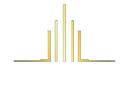




OU ISRAEL CENTER 29 CONTACT US FOR DETAILS Phone * 2302 // 050 816 1612 officecohens@gmail.com PRE-SALE Choose from 2-3-4-5 bedroom apartments, featuring Garden units & Penthouses, in the new boutique project on Katamon's prestigous Antignous Street
PROBING
BY RABBI NACHMAN (NEIL) WINKLER Faculty, OU Israel Center
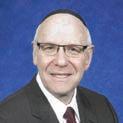
THE PROPHETS
The rather well-known haftarah that we read this Shabbat is taken from the very first perek of Sefer M’lachm and describes the final days of King David’s reign over Israel. It is, in truth, an introduction to the era of the kings, as the final half of this first chapter – the part that is not included in the haftarah itself - describes the coronation of Shlomo HaMelech, an act that, for the first time, creates a “dynasty” for Israel, with the son of the king succeed ing to the throne (which is why the Book of “Kings” begins at this point).
The story included in the haftarah, how ever, focuses on the attempt of David’s oldest surviving son, Adoniya, to gather public support for his “nomination” to the throne – an attempt that was thwarted by the actions of Bat Sheva (the mother of Shlomo) and the navi, Natan. Essential to the story as well, is the text’s description of the elderly, weak monarch who was not aware of his son’s machinations and who was so frail that he could not even keep
NACHI REALTY 054-461-3943
Great Investment! 2 rooms in a new building under construction in a great location. only 1.69m NIS. 3 & 4 rooms available as well New on the market! 4 rooms on Chizkiyahu HaMelech in Katamon, 2nd floor, beautifully renovated, 2 full bathrooms. 3.49m shekel
himself warm – a fitting explanation as to why Adoniya felt that he could undermine the sitting regent.
All of this is related in the haftarah and is, therefore, quite familiar to most.
But what most of us do not know is how the story of David’s final days is related to us in “Chronicles” (Divrei HaYamim A). There (and I urge you to open the Tanach and read chapters 28-29 for yourself), we read of a leader who is vigorous, forceful and energetic. David HaMelech gathers all of the nation’s leaders and proclaims that Hashem had chosen Shlomo to suc ceed him upon the throne of Israel and to build the Bet HaMikdash – something that he, David, was not allowed to do. He then gives Shlomo the blueprints for the con struction of the First Temple, he divides the Kohen and Levi families and gives them each their respective responsibilities in the Temple service, and he then charges Shlomo to carry out the massive construc tion undertaking.
Now, if this were not enough, the text continues to explain how David had, in his lifetime, started gathering precious met als for the Bet HaMikdash and, during his final days, David starts a “Building Fund” to which many of the wealthy contributed! The Sefer concludes with the king’s bless ings given to all who gathered and with a description of the massive celebration of Shlomo’s coronation – in which David
30 TORAH TIDBITS 1492 / CHAYEI SARA 5783
Rabbi Winkler's popular Jewish History lectures can be viewed by visiting the OU Israel Video archive: https://www.ouisrael.org/video-library
participated as well.
So….(phew), where is the frail, weak king who could not warm himself nor even know what was transpiring outside of his palace? Where is the Melech David of Sefer M’lachim?
Will the real King David please stand up?
We could suggest that all of these details found in Divrei HaYamin happened earlier, when David was still strong and hearty. And that the different foci of the two books were based upon the different goals of each. Sefer M’lachim, written by Yirmiyahu HaNavi, was meant as a lesson to the newly exiles Judea to realize that their defeat was not the result of a more powerful Babylonian army or, chas v’shalom, a more powerful divinity (which is what many believed at the time), but their downfall was caused by their own sins and had been predicted and warned by Hashem. For this reason, the Sefer focuses on the succession of King Shlomo to David’s throne in order to begin recording the people’s corruption that would grow progressively from one king to the next; from one generation to the next.
Divrei HaYamim, however, was written some two generations later – after the Judeans returned to Tziyon – and had the goal of encouraging returnees to reestab lish the leadership of the Davidic dynasty and to rebuild the Beit HaMikdash. For this reason, they emphasized the glory of the earlier kings and the magnificence of the Holy Temple. Hence, the focus on David’s efforts in establishing Shlomo’s throne and preparing the Beit HaMikdash.
The problem is that it seems clear in Sefer M’lachim that the people did NOT know of Hashem’s choice of Shlomo as a
successor. That is precisely why Bat Sheva and Natan pleaded with David to make a public announcement that Shlomo was the future king!! So, the story, as told in Divrei HaYamim had to take place AFTER the description found in Sefer M’lachim – not BEFORE!!
I would suggest that, difficult as it might have been, David, realizing that the future of his dynasty was in jeopardy, got off his bed, left his palace, gathered as much strength as he could and accomplished what we read in Chronicles.
What human beings are capable of doing in times of emergency is what creates legends. At crucial times, people can accomplish the seemingly impossible. Especially, when Hashem is behind you. And, especially, when you’re David HaMelech!

OU ISRAEL CENTER 31
Avraham’s Minimized Grief
Following the Akeda we are told that Avra ham arrives in Hebron and is informed of the loss of his wife Sara. Avraham, as would be expected, eulogizes his wife. The Torah states:
Abraham came to eulogize Sarah and to bewail her. (Bereshit 23:2).
Eulogy then Crying
At first glance it seems like the actions listed in the pasuk are out of order. Typically, when being informed of a spouse’s death one would first internalize the event, shed tears and then compose themselves to be able to properly eulogize the deceased. It seems that Avraham first provided a eulogy and only thereafter cried and engaged in personal bereavement.
Rav Yosef Dov Soloveitchik (Family Redeemed) suggests that Avraham under stood that Sara was respected by all and her absence was felt by many. He first sought to comfort others who had experienced deep sorrow upon hearing of the death of Sara and only later to consider his own grief. It highlights the impact Sara had on the com munity and Avraham’s recognition of her
influence on so many others.
Minimizing Crying
The Ba’al Haturim explains that the word התכבלו has a small ”כ” to symbolize that Avraham only cried briefly after learning of Sara’s death, understanding that Sara died from old age. The Otzrot HaTo rah inquires as to why the Torah needs to highlight that Avraham cried briefly? Is it praiseworthy that Avraham minimized his crying while mourning the loss of his wife Sara? Additionally, why is the reason offered for Avraham’s minimal crying that Sara died of old age. Are people who lose an elderly relative discouraged from expe riencing sadness? Sara had such a positive impact on so many people, that alone is cause for tremendous sorrow and grief. When Aharon and Moshe died the nation mourned for 30 days. Why would Avraham cut his grief short?
Perhaps we can learn a tremendous lesson from Avraham’s conduct in this situation. Rashi explains that Sara’s death appears following the Akeda because her having been informed that Avraham was about to sacrifice their child Yitzhak, caused her sudden death. The Yetzer Hara sought to implant doubt in Avraham: “Maybe I should not have been so quick to agree to sacrifice my son. Had I not obliged with God’s request, Sara may still be alive.”
When the yetzer hara is unsuccessful in preventing us from fulfilling a mitzva, it

32 TORAH TIDBITS 1492 / CHAYEI SARA 5783
RABBI
Rav Kehilla, Nofei HaShemesh Maggid Shiur, Daf Yomi, OU.org Senior Ra"M, Kerem B'Yavneh
SHALOM ROSNER
הָרָׂשְל
:ּהָֽתֹּכְבִלְו
דֹ ּפְסִל ם ָהָרְבַא אֹבָּיַו
seeks to ex post facto have us feel remorse over having performed the mitzva, thereby uprooting it retroactively. Avraham under stood that Sara was old and her time would come shortly, even if his act may have triggered her death slightly pre-maturely. Therefore, he minimized his grief and attributed the main cause of her death to her old age. Had Avraham extended his grieving it may have been interpreted as having remorse for agreeing to sacrifice Yitzhak.
The Hafetz Hayim comments on a pasuk in Zechariah (3:1, from the haftara of Hanukka): “And he showed me Yehoshua the kohen gadol standing before the angel of Hashem, and the satan standing at his right hand to accuse him.” The Hafetz Hayim asks: Why is the satan standing on the right side? Usually, the right side is symbolic of good and the left symbolic of bad.
He explains that the yetzer hara often dresses up like a mitzva. The yetzer hara realizes that it can’t cause us to sin in an obvious, direct way. Thus, he might tell a yeshiva boy to stay up late to learn, which seems like the righteous thing to do, all with the hope that the boy will oversleep and miss minyan the next morning.
Avraham was careful not to portray in any manner that he may regret fulfilling a mitzva. May we be careful in our perfor mance of mitzvot and in our conduct so that we don’t allow the yetzer hara to succeed retroactively and pervert our good deeds.





www.angelrealty.co.il

For Sale in The Village, Zayit, Eftat Stunning 210m 8 room cottage, 2 private parking spots, central A/C. 4,800,000 NIS
For Sale in Dagan, Efrat Stunning 8 room cottage, middle unit. 3 floors, 230m. 5,250,000 NIS For Sale in Gefen, Efrat Beautiful 5 room duplex garden 2,850,000 NIS
For Sale in Dekel, Efrat 4 room apt. 2,150,000 NIS For Sale in Olive Project, Zayit, Efrat Gorgeous 4 room apt. 120m. 2,850,000 NIS For sale in Zayit, Efrat 5 room garden apt. 2,850,000 NIS Contact Gabi for more info 0524588716
Gabi 0524588716

Dr.
OU ISRAEL CENTER 33
J Facial Aesthetics Soften Lines & Reduce Wrinkles Botox | Fillers Hair Growth | Acne Scars Jason Cohen, M.D. Certified Aesthetic Medicine Specialist Anesthesiologist & Interventional Pain Medicine Modiin Clinic 050-252-0991
SMILES
Perfect Perspective
The Torah details the years of Sara Imeinu’s life, concluding with, “Shenei chayei Sarah - These are the years of Sar ah’s life.” This addendum is clearly meant to teach us something. Basing his com mentary on Chazal, Rashi notes, “kulan shavin letovah -all her years were equally good.” One obviously wonders what Chazal meant by this. Sara Imeinu’s life was certainly not free of suffering, how can one say that all the years of her life were equally good?
Rav Scheinerman in Ohel Moshe notes that Chazal is referring to Sarah Imeinu’s middah of bitachon. Objectively, barrenness, hunger, captivity and internal family strife, are difficult, stressful and painful situations. Nothing about any of it looks remotely good. However, when one understands that everything Hashem does is good, than suddenly, every situation is reframed to be perceived as good. The middah of bitachon allows us to recognize that every circumstance and
Faculty, OU Israel Center
experience we have is uniquely designed for each one of us. Moreover, everything we encounter enables us to develop into the best people we can become. Sara Imeinu saw everything that transpired in her life as being good for her. “Shavin letovah”, every thing was equal in her eyes, the good and the challenging. Rav Schorr in Halekach Vehalebuv explains the verse, “shiviti Hashem lenegdi tamid” (Tehillim 16;9) in a similar fashion. “Shiviti” is generally translated as “I place” but it also shares a root with the word “shaveh – equal.” “Shiviti” is the ability to equate everything, even those experiences that are ‘lenegdi’, that feel like they are going against me, as always being exactly what Hashem wants for me. It is the understanding that the totality of our lives’ conditions is exactly what is good for us.
In his book, “Why Bad Things Don’t Happen to Good People,” Rabbi Rosenblatt explains that “gam zu letovah” does not mean that this will ultimately lead to some thing good, rather, this in and of itself is good. He challenges his readers to see good ness in every situation. He further asserts that when one attempts to see things as good, one will be able to find goodness. Sara Imeinu’s other name was Yiska, mean ing “one who embodies a vision”; this was the greatness of her vision, to see goodness in everything that transpired.
The Slonimer Rebbe (Netivot Shalom) understands Chazal’s interpretation with
34 TORAH TIDBITS 1492 / CHAYEI SARA 5783
REBBETZIN SHIRA
Mazal Tov to Rabbi Dave & Chani Felsenthal and family on the birth of their granddaughter, daughter of Avromi & Sarah Felsenthal
a different approach. Midrash Rabbah teaches that the lives of righteous people begin with hardship and end with tranquil ity. Righteous people often have difficulties, tests and challenges that are painful, try ing, even bewildering. Yet, once the test has passed and the growth is apparent, one can appreciate the great heights he has reached. Sara Imeinu had many crises and hardships in her life. However, at the end of her life, she was able to look back and see how all of them amounted to greatness and goodness. She was able to see how all she endured had purpose and contributed to her personal growth. In this sense, “gam zu letovah” means ultimately this too is for the good. When we understand that every detail is part of a larger picture to help us grow and develop, we appreciate every nuanced event more deeply.
FOR SALE



2 BDRM 60 M GARDEN APT IN KATAMONIM EXPANSION POTENTIAL, 2 ENTRANCES LARGE WRAP AROUND GARDEN 3.3 MILLION NIS
FOR RENT





4.5 ROOM APT ON MENDELE ST, TALBIEH 100 M, 3.5 BDRMS, 1.5 BATHS, BALCONY ONLY 7 STEPS, VERY GOOD CONDITION 7800 NIS

3 RMS ON TCHERNICHOVSKY ST 80 M, FURNISHED, INCLUDES APPLIANCES 3RD FLOOR WITH ELEVATOR 6900 NIS
Ilana Nelson 054.5341403 www.integrityrealestate.co.il

OU ISRAEL CENTER 35
Israel’s LEADING and MOST TRUSTED furniture repair company Glue with us once and you’ll stick with us forever PERMANENT REGLUING for all your loose & shaky furniture EXPERT SOFA FRAME & RECLINER REPAIR SEAT CORE REPLACEMENT- Remove broken wood seat and replace with much stronger wood CANE SEAT/BACK REPLACEMENT FURNITURE MARKERS - To help you make those small scratches disappear LEG TIPS - For quiet chair movement (your downstairs neighbor will thank you!) TIRED OF HAVING TO CROWD YOUR GUESTS AROUND MULTIPLE TABLES?? Call us to hear about our heavy-duty table slides to
triple!) the current
of your table. INSURANCE QUOTES - We handle hundreds of freight damage claims from overseas as well as local moves. Website: www.thefurnituredoctor.co.il
T RESTORE YOUR FURNITURE TO HEALTH!
more than double (or even
length
Email: office@thefurnituredoctor.co.il Phone: 02-999-2418 WhatsApp: 058 787 3755
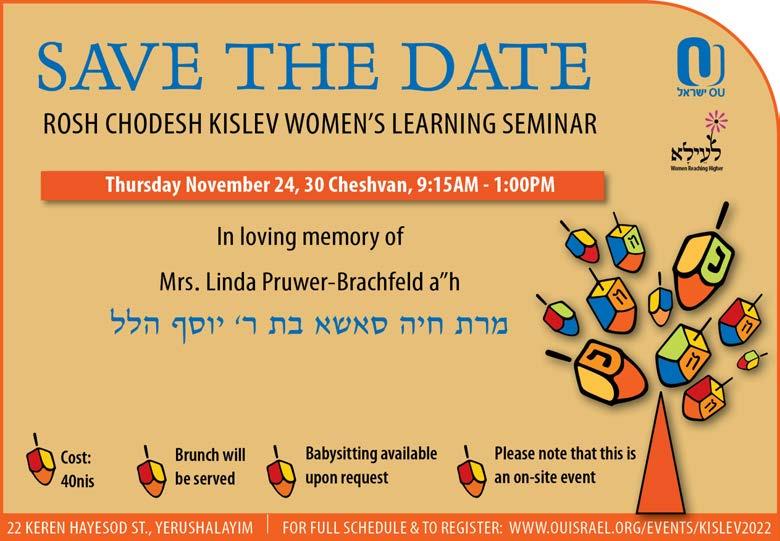

36 TORAH TIDBITS 1492 / CHAYEI SARA 5783

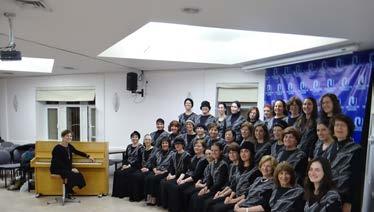
OU ISRAEL CENTER 37 PRI HADASH WOMEN'S WRITING WORKSHOP AT THE OU ISRAEL CENTER Monday mornings 10.30-12.30 For more details, call Ruth 02-628-7359 or Judy 054-569-0410 DOROT - The OU Women's Intergenerational Choir Director Hadassah Jacob 052-384-7230 Monday Evenings 7:00 - 9:00pm GET FIT WHILE YOU SIT: Exercise for ladies Join us on Sundays 12:45-1:30pm at the OU Israel Center Sura Faecher 0504153239 Knitting Club at the OU Israel Center every other Thursday beginning July 21, 1:30-3:00pm Call 052-734-6354 for details ...המלש האופר • Miriam Tovah Chaya bat Chanah Elisheva Rivka •Yosef Ezriel ben Chaya Michal הלחמ ןב ןתנוהי • רתסא ןב המלש • לזייר הניס ןב ץרה ילתפנ • הכרב הנח ןב השנמ םהרבא • • Esther Fruma bat Baila • Yisrael Leib ben Chana

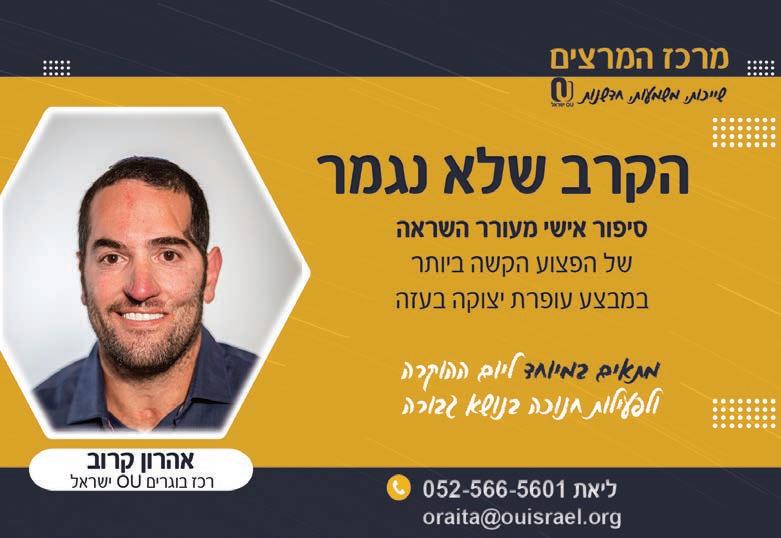
38 TORAH TIDBITS 1492 / CHAYEI SARA 5783

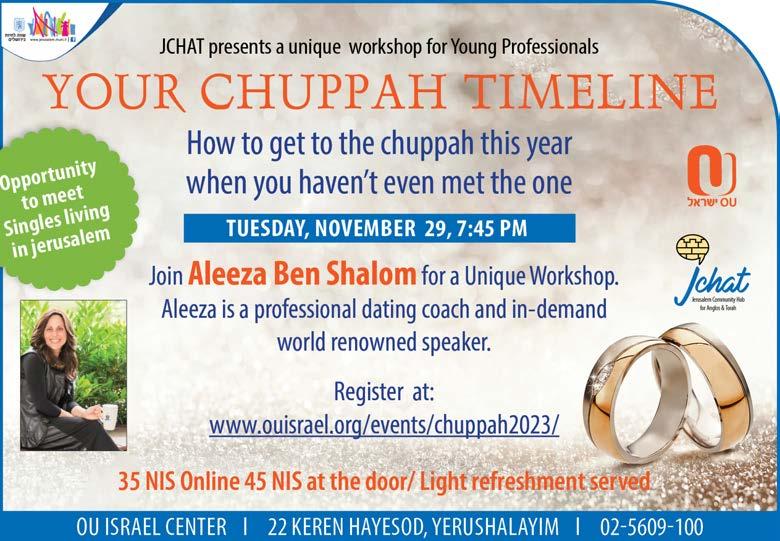
OU ISRAEL CENTER 39

40 TORAH TIDBITS 1492 / CHAYEI SARA 5783
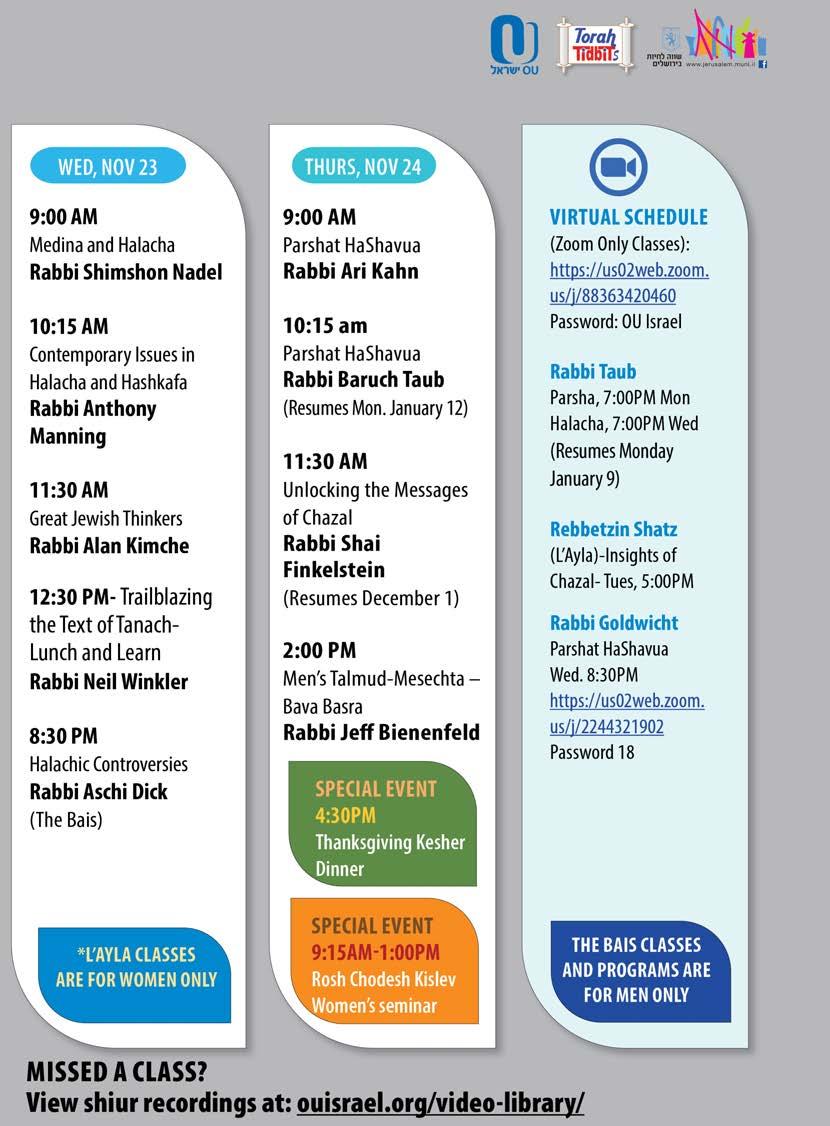
OU ISRAEL CENTER 41














42 TORAH TIDBITS 1492 / CHAYEI SARA 5783 לארשי ץראל עסמה לארשי ץראל עסמה

OU ISRAEL CENTER 43
Real Life Rescues
After Nearly Being Declared Dead, 87-year-old Man In Ramat Hasharon Revived By EMTs
Ramat HaSharon - Last Sunday just after noon, an 87-year-old man had a cardiac arrest in his house on Harav Kook Street in Ramat HaSharon. The emergency was reported to United Hatzalah’s Command and Dispatch center which immediately alerted nearby EMS first responders.


Shay Golan, a United Hatzalah volunteer EMT, was on Harav Kook Street when his proximity alert went off, and he rushed over to the incident. When Shay arrived at the scene a few moments later, a paramedic had just arrived and the pair of first responders found the man lying unconscious on a sofa. The paramedic and Shay moved the man to the floor to initiate CPR. Together they performed chest compressions and attached a bag valve mask device to the man’s mouth in order to provide him with assisted ventilation.

Meir Mordechai Farkash, another United Hatzalah volunteer EMT, was at his work in a yeshiva when his communication device beeped, alerting him to the emergency. Meir rushed to his ambucycle and drove to the emergency. Arriving at the scene along with an intensive care ambulance crew, he joined the efforts to revive the man.
After approximately 30 minutes of CPR, one of the paramedics at the scene told the EMTs to stop in order to pronounce the man's death as he wasn’t responsive to the rescue efforts. However, just as the team was about to comply, they suddenly noticed a slight change in the man’s pulse, prompting them to continue their effort. Moments later, the group heaved a collective sigh of relief when the man’s pulse was fully restored. The first responders then transferred him to the ambulance and he was transported to the nearest hospital for continued care and treatment.
Shay recounted after the incident: “It wasn't easy and the continued effort was uncertain, but I'm glad we ended up with a success like this. I wish for every CPR to end successfully. It can be very stressful to be an EMT, but I truly believe in saving lives and overcoming the extra stress it places on a volunteer first responder in order to help people. Today’s CPR was the best example of that.”
Private entrance, 4 bedrooms, Family room, Dining room and Living room
4 full bathrooms and a laundry room, 2 nice size terraces
Covered parking spot and a storage room, Private land 210 sqm of indoor space + 60 sqm of outdoor space
Duplex garden: 237 sqm + 77 sqm garden
Triplex garden: 260 sqm + 130 sqm garden

Duplex PH: 350sqm + large terrace with spectacular views

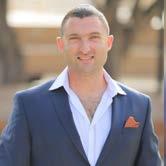



Large 2 Bedroom Apartment: 118 sqm + 34 sqm balcony Private underground parking & storage
Shabbat elevator
High-end specs
Starting at: $20,000/sqm
Occupancy: less than a year
44 TORAH TIDBITS 1492 / CHAYEI SARA 5783
1221 Luxurious Complex on one of the Best streets in the German Colony
Only 4 apartments in the building
Listings
Yitzchak Kowalsky
Luxury Family Cottage in the German
Most Recent
in Jerusalem
Great
Colony/border of Talbiyah
054-766-0338 Yitzchak@yykrealestate.com www.yykrealestate.com
Peter Hersh, Director, Logicca Chartered Accountants, Sydney

OU ISRAEL CENTER 45
/ Israel Tax Planning and Recent Developments
Australia
How Your Superannuation Fund Can Secure Your Retirement in Israel With the strong shekel continuing to impact the financial security of Australian Olim, how your Superfund and other assets can provide you with the right investment strategy.
Wealth
Seminars for
Monday, November 28th, 10:00 David Citadel Hotel Jerusalem Wednesday, November 30th, 18:00 Pioneer offices, 8 Hasadnaot St. Herzliya Pituach To reserve your place please contact Andrew Album: andrewa@piowealth.com WhatsApp 054-655-9261 Pioneer Financial Planning (92) Limited is a Portfolio Management and Investment Marketing company (in contrast to an Investment Advisory).
Andrew Album, Senior Wealth Manager, Pioneer
Management, Israel Exclusive
Australians in Israel















































































































































































































46 TORAH TIDBITS 1492 / CHAYEI SARA 5783 THE ISRAELB ONLINE COMMUNITY Connecting you with fellow Jews, Israel & the Jewish People! n Install the new ISRAELB APP from the google play store to your phones (Dedicated in memory of Elchanan Yosef ben Chaim Eliezer) n Advertise on our new ISRAELB BUSINESS CENTER to gain exposure for your business n We can help you WRITE SPEECHES AND DIVREI TORAH for family events & Smachot n Use IsraelB to ORGANIZE, PROMOTE AND PUBLICIZE your events and Smachot n Use IsraelB to help you SELL OR RENT OUT YOUR PROPERTY CONTACT BENJY SINGER: benjysinger@israelb.org or 053-285-1526 Subscribe to our IsraelB newsletter, follow us on Twitter (@IsraelBayit) and join our Facebook Page & Groups. (Links on IsraelB.org) IsraelB is your resource for jobs, events, community news, shiurim and much more!
Us
You OU Israel is seeking a full-time, fully bilingual, EXPERIENCED ADMINISTRATIVE ASSISTANT. Do you have a neighbor, brother, niece, cousin who is fluent in Hebrew & English and looking for meaningful work? Minimum 2 years of administrative assistance. Hebrew CVs should be sent to: lbejell@ouisrael.org Shifra and Rivka properties! Shifra lopian 0526735300 UNIQUE DUPLEX IN RECHAVIA with roof top terrace!
views, roof rights, Parking, 3 bed, 2.5 bath
to purchase another unit and attach 5.25m nis LUXURY NEW KATAMON APARTMENT! 3 bed, 2 bath, Large sukka balcony, quiet, parking, storage, 5.8m NIS
Help
Help
Gorgeous
Option

OU ISRAEL CENTER 47
MISCHEL
Holy Shlepping
The holy Rav Yosef Chaim Zonnen feld, zt’l, was one of the great tzadikim of Yerushalayim in the early part of the Twentieth Century. A talmid of the Ksav Sofer and one of the founders of the Eida Chareidis, he was respected as a scholar and poseik, as well as for his unwavering commitment to tradition during a turbu lent time. An account of his life is told in the multi-volume sefer, HaIsh al haChomah. Rav Zonnenfeld’s daughter, Rebbetzin Rochel Breindel Friedman, shared the fol lowing memory of her great father: Once when she was a young girl, her father was particularly late in returning from the Beis Medrash. Concerned about his whereabouts, Rochel Breindel’s mother sent
her to go and see if anything was wrong. On the way, she found her father filling up pails of water for two little children. “Tatty, what’s going on? Are you the new vasertreiger, the new water-schlepper in town?”
“My dear,” he replied, “as I was coming home I saw these two children standing dan gerously close to the edge of the well trying to draw water; I admonished them to move away, that it was unsafe, and ‘Let the water boy bring it to your house!’ The older of the children replied that they couldn’t afford to have water delivered. I asked where there parents were. Their mother recently gave birth and their father is sick in bed with a fever and unable to leave the house. I’ve been drawing pails for them to bring home to fill the water tank….”
“But Tatteh, you’re wearing a kaftan and are the Rav of the neighborhood, what will people say?” She asked her father. “It’s not kavodik, it is below your dignity.”
In a good area in the Moshava - 2-story garden apartment, 200m + 190m garden, in Tabu, has great potential, parking, storage, for renovation. Asking 8.2 million NIS In a good area in the Moshava2 apartments (can be connected), 1st floor, 170m, renovated, Sukkah porch, parking Palmach - 4 rooms, garden apt. about 100m asking 4.95million NIS Smadar 050-3114040 // 02-642-4329 smadi_bida@walla.co.il

“What will people say? What would the Ribbono Shel Olam say if I didn’t help these children? Could I go home and calmly eat my breakfast while these poor young children are endangering their lives in order to bring water for their incapacitated parents?”
Rav Zonnenfeld straightened up and looked his daughter lovingly in the eye. “Please remember, my child, there is nothing more mechubad, nothing more honorable, than helping other Yidden.”

48 TORAH TIDBITS 1492 / CHAYEI SARA 5783
RABBI JUDAH
Mashpiah, OU-NCSY Executive Director, Camp HASC Author of Baderech: Along the Path of Teshuva (Mosaica 2021)
Our sedra recounts Eliezer’s mission to Aram Naharayim to find a wife suitable for Yitzchak Avinu. Eliezer davens that Hashem will perform a chesed for his master Avra ham, namely a clear indicator that he has found the right match: a young woman among the maidens at the city’s well, a central meeting spot, who would be forth coming and gracious in offering water for him and his camels. Before even finishing his tefillah, Eliezer spots Rivka: הָנְיַעָה
…And behold, Rivka came out… and her pitcher was on her shoulder; and she went down to the spring, and she filled her pitcher and ascended. םִיַמ־טַעְמ
The servant ran toward her and said, “Please, let me sip a little water from your pitcher.” ׃ּוהֵקְׁשַּתַו ּהָדָי־לַע ּהָּדַּכ דֶרֹּתַו רֵהַמְּתַו יִנֹדֲא הֵתְׁש רֶמאֹּתַו

“Drink, my lord,” she said, and she quickly lowered her pitcher upon her hand and let him drink. (24:15-18)
Rashi explains why Eliezer was excited and ran toward Rivka: ּהָתאָרְקִל , seeing that the water rose up from within the spring to greet her, he under stood that she was a woman who merited a miraculous event. Witnessing this, Eliezer sensed it might be the answer to his prayer, and this was confirmed as Rivka generously offered him a drink and to fetch more water for his camels and entourage. This time however, there was something different as Rivka approached the spring: ויָּלַמְּג־לָכְל בַאְׁשִּתַו בֹאְׁשִל רֵאְּבַה־לֶא דֹוע ץָרָּתַו

OU ISRAEL CENTER 49
דֶרֵּתַו …ּהָמְכִׁש־לַע ּהָּדַכְו… תאֵצֹי הָקְבִר הֵּנִהְו
אָנ יִניִאיִמְגַה רֶמאֹּיַו ּהָתאָרְקִל דֶבֶעָה ץרָּיַו
+972 058-7567437 KosherDiamonds.com Luxury lab grown diamonds at affordable prices
…And she ran again to the well to draw water, and she drew for all his camels. (24:20)
Unlike the first time Rivka approached the wellspring and the water rose up to greet her, this time there was no super natural event. In fact, she had to expend considerable effort, lowering the jug, filling it and then lifting the heavy vessel onto her shoulder.
The Kedushas Levi, Rebbe Levi Yitzchak of Berditchev, zy’a, shares an important insight, suggesting why this is so: הכרוצל םימה בואשל היה התעדבד הנושאר םעפבו ןויכ ,המצע חירטת אלש התארקל םימה ולע ןכ ללג ,הכרצל בואשל היה התנווכש
When Eliezer saw Rivka for the first time, she was simply getting herself a drink to quench her thirst. In order to honor the needs of the tzadekes, the Ribbono Shel Olam performed a miracle, and the water rose to greet her. The world is in service of the righteous…. דסח לומגל היה התנווכש ,הינש םעפב ןכ ןיאש המ םימה ולע אל םהרבא דבע רזעילא לש םילמגה תוקשהל ,התארקל
However in her second trip to the spring, when Rivka’s intention was to serve Eliezer, to draw water not for her own needs, but for him and the camels, no miracle was forthcoming and the water did not rise to greet her. הלועפ תושעל בשחנ רתוי הוצמ השוע םדאשכש …הוצמל רתוי ול בשחנ הוצמ םשל
For what is most essential in a mitzvah — and in performing an act of chesed in particular — is the hard work, investment and effort we expend. There are no short cuts in giving to others, because a shortcut might diminish the reward, as expressed
in the piyut Yigdal, recited in our daily prayers: :ֹותָעְׁשִרְּכ עָר עָׁשָרְל ןֵתֹונ ,ֹולָעְפִמְּכ דֶסֶח ׁשיִאְל לֵמֹוּג
“Hashem repays the righteous for his actions, and punishes the wicked in proportion to their wickedness.”
While we are held accountable for the wrongdoings that we commit k’rishaso, “according to their negativity”, the acts of chesed and goodness that we have done are rewarded k’mifalo, “according to our action”. And the reward for this is gen erous, as it takes into account all of our intention, investment and effort.
אריו ויניע אשיו ברע תונפל הדשב חושל קחצי אציו םיאב םילמג הנהו “Yitchak went out to converse with God in the field at dusk, and he raised his eyes and saw, behold, camels were arriving….” (24:63)
The Torah’s choice of language, that Yitzchak lifted up his eyes and saw םילמג, “camels”, is puzzling. One would expect more of an ‘uplifting vision’, for instance, seeing his wife-to-be, Rivka Imeinu! Rebbe Meir of Premishlan, zy’a, explains: Yitzchak did see Rivkah, and then “lifted his eyes”, looking into the future. He was ‘uplifted’ when he foresaw that their descendents would have the trait embodied by his bride — they would be םילמוג, “givers”, actively generous and kind.
May we, the physical and spiritual descendents of our great-grandmother Rivka, continue her precious legacy. And may we merit to ‘uplift’ our great-grandfa ther Yitzchak by taking up the great honor of ‘shlepping water’ for one another.
50 TORAH TIDBITS 1492 / CHAYEI SARA 5783
הלועפ ותושעבש
GOOD DEAL!!! In New Talpiot –Spacious 2 rooms, 50m, recent, Shabbat elevator, terrace, calm, store-room, parking MENDEL 052-8980111


TALBIEH - Building with high ceilings –4 spacious rooms, 108m + terrace (approx. 30m), elevator, to renovate MICHAEL 052- 3202488 In the heart of BAKA, in an Arab house and a pastoral street, garden apartment 4.5 rooms, spacious, lots of storage space, partially furnished, garden, 60m MICHAEL 052-3202488

OU ISRAEL CENTER 51
VERY GOOD INVESTMENT! In Bustan Baka - In a very beautiful boutique building – spacious 2 rooms, ground floor (0 steps), elevator, balcony, parking 2450000 NIS MENDEL 052-8980111
SIMCHAT SHMUEL
BY RABBI SAM SHOR Program Director, OU Israel Center
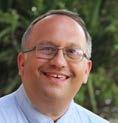
This Shabbat marks the 64th yahrtzeit of the great tzadik Rabbi Yaakov Friedman, the Admor of Hosiyatin zy’a. A descendant of the illus trious Reb Yisrael Friedman, the Rizhiner Rebbe, z’ya, Rav Yaakov made aliya to Eretz Yisrael in the late 1930’s, and succeeded his father-in-law as the Admor of Hosiya tin in Tel Aviv. His drashot and teachings are recorded in a beautiful sefer known as Ohalei Yaakov. The Rebbe lived through the formative years of the establishment of the State of Israel, during the turbulent times of both the days leading up to the Declaration of Independence, the subsequent war, and the earliest days of our fledgling state, and was a powerful voice for the importance and significance of the return of the Jewish People to the Land.
Our Sedra this week opens with the passing of Sara Imeinu, and Avraham’s pur chase of Ma’arat HaMachpela in Chevron. The pasuk tells us:
“V’Tamat Sara B’Kiryat Arba, Hee Chevron…” “And Sara died in Kiryat Arba, which is Chevron....”
The Ohalei Yaakov points to a very interesting Midrash in the Yalkut Reuveni, which offers a creative interpretation of this pasuk:
‘V’Tamat Sara B’Kiryat Arba - And Sara passed on b’kriat shema while reciting the daled (the fourth letter) at the end of the word echad- of kriat shema....”
Kiryat Arba- represents Sara’s recitation of Kriat Shema as she left this world and entered the next.
The Rebbe, in explaining this Midrash, points to a teaching from the great Mekubal, Rav Chaim Vital zy’a, prime disciple of the Arizal. In Shaar Hay of Shaar HaKavanot, Rav Chaim Vital wrote:
“We must be prepared to give our lives, to sanctify Hashem’s name. The daled in the word echad in the first verse of the Shema, represents Hashem’s four letter name...”
The Ohalei Yaakov, takes this idea from Rav Chaim Vital, and explains that Sara Imeinu, as she departed from this world, leaves us an eternal message connected to the unbreakable bond between the Jewish people and our sacred Land.
Throughout our history, the Rebbe explains, and especially during the turbu lent early years of Medinat Yisrael, which the Rebbe merited to experience, Am Yis rael has been willing to risk their lives for the gift that is Artzeinu HaKedosha. May we always remember and hold dear the many neshamot who have enabled us the zechut to build our lives in our sacred, eternal home.
A small Sefer Torah with its own Aron Kodesh is available to shiva houses or for any other necessary occasion on a temporary free-loan basis.
If needed call Uri Hirsch 0545513173
52 TORAH TIDBITS 1492 / CHAYEI SARA 5783
SHIUR SPONSORS













Thursday, November 10 - Rabbi Ari Kahn’s shiur was sponsored in memory of our loved ones by the Silvers Family Tuesday, November 15 - Rebbitzen Shira Smiles Shiur was sponsored in honor of the birth of our first great- grandson, born to our grandchildren, Eli and Shevy Factor by Leah & Bernie Weinberger Rebbetzin Shira Smiles shiur is sponsored for the 2022 academic year by Dr. & Mrs. Menachem Marcus in memory of their parents Rose & Dr. Emanuel Marcus
Rosi & Ernest Strauss
Rabbi Goldin’s shiur is sponsored for the 2022 academic year by Dr. & Mrs. Menachem Marcus in memory of beloved aunts Irma Haas a”h and Hilde Myer a”h
Rabbi Manning’s shiur has been sponsored for the 2022 academic year ל”ז ןמלק ןב גילזו ה”ע תידנב תב הנרב תמשנ יוליעל
Rabbi Kimche’s shiur has been sponsored for the 2022 academic year ל”ז המלש ןב
Rabbi Taub’s weekly Thursday Parshat HaShavua Shiur is sponsored by The Jewish Legacy Foundation

Rabbi Breitowitz’s Sunday shiur for the 2022 academic year has been sponsored in Loving Memory of Rachel bat Yehuda Aryeh & Hensha a”h

OU ISRAEL CENTER 53 OU ISRAEL CENTER 55 “TzviAir is a pleasure to work with and did an amazing job!” – Jamie Geller, Celebrity Chef AIR CONDITIONING SALES & SERVICE 02-628-8282 | tzviair.com MAXI BoX 053-7272-815 ד״סב Storage Your place for extra space
ל”ז סוקרמ
ןב
ל”ז
השמ
יכדרמו ריאמ ףסוי תב לזייר and
סוארטש דוד ןב לאינדו םהרבא תב דומיל
בוט םשו ה”ע םהרבא תב םירמ תמשנ יוליעל
GEULAS YISRAEL
BY RABBI MOSHE TARAGIN R am, Yeshivat Har Etzion
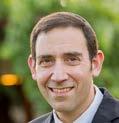
The Camels
Avraham’s servant was dispatched to his former home in Aram Naharayim to secure a bride for Yitzchak. Without a reliable mode of transportation, this lengthy trip to modern-day Iraq would have been impossible. Fortunately, Avraham owned a team of able-bodied camels to facilitate this voyage.
Ten Camels, Three Stories
For some odd reason, the Torah men tions the camels ten times and, moreover, it spot lights these camels during the dramatic scene at the “well”. Avraham’s ser vant had declared that the first woman to both feed him and provide water for his thirsty cam els, would be selected as a bride for Yitzchak. The Torah describes the servant’s original pro nouncement, the actual incident of Rivka offering water to the camels and, finally, the retelling of this whole story to Rivka’s parents. Effectively, we read about the cam els drinking water three times!
Rashi already sensed the disproportionate coverage given to the camels and claimed that Avraham’s moral integrity was showcased by the honorable behavior
of his camels. Typically, animals in tran sit graze indiscriminately from whatever food lies along their path. Unlike most animals however, Avraham’s camels were well-trained, only consuming food which belonged to their master. For this reason, they had eaten sparingly along the journey and were probably starving when they finally arrived at the watering hole. Avra ham’s moral code ran so deep that it even manifested itself in his camels!
Beyond Rashi’s view that the camels sig nal Avraham’s moral probity, there are additional reasons that these iconic animals are so prominently featured and so frequently mentioned. Apparently, they symbolize a deeper theme of this narrative.

Going International
In a career dedicated to disseminating knowledge of Hashem, Avraham had traveled extensively, yet, almost of all his travels, were local jaunts within the Land of Israel. He fulfilled the instruction of הבחרלו הכראל ץראב ךלהתה םוק and deeply impacted the residents of Israel, shap ing both their religious views and their socio-political structures.
Avraham’s impact, though, was barely noticed outside of Cana’an. His only excur sion beyond the boundaries of Israel ended
54 TORAH TIDBITS 1492 / CHAYEI SARA 5783
poorly, as he was caught deceiving Pharo and promptly evicted from Egypt. The father of all nations had successfully influ enced his local neighbors, but had yet to extend his reach beyond the Land of Israel.
This journey to his Homeland was his first, and also his final, opportunity to spread his message internationally. This expedition isn’t just a quest for a bride for Yitzchak, but is also a cultural exchange, presenting Avraham’s religious value sys tem to a broader audience.

Each and every interaction between our Avot and their contemporaries was a multilayered encounter. When they negotiated for Land purchases, signed treaties, or went to war, they were also modeling moral behavior and disseminating religious ideas. This trip to Aram Naharayim is no different, and provides Avraham with an opportunity to influence the family he left behind decades ago.
Unfortunately, at this advanced age Avraham is too infirm to personally make the journey, so he dispatches his trusted servant instead. Avraham was capable of quick journeys, such as the trip from the akeidah in Yerushalayim to Chevron to bury Sarah, but lengthier trips to Iraq are simply out of the question. This trip to a distant land is vital to his mission of both inspiring monotheism and delivering pros perity to humanity. Avraham’s influence is spread by his servant and for this reason, the name of the servant is suppressed. The servant’s journey is, in reality, a migration of Avraham’s influence.


Delivering Prosperity


The iconic camels embody both the dis tance of the journey and the purpose of the

OU ISRAEL CENTER 55
In the Tama 38 project on the border of Rechavia neighborhood, a quiet 4-room apartment. APARTMENT • 101 sqm • 105 sqm balcony (partially sukkah) • Elevator • Parking • 3 air exposures • Full accessibility Offered at: 4,400,000NIS T +972-2-567-0303 E: info@prosperity-realestate.com prosperity-realestate.com Tchernichovsky 5A Jerusalem Your trusted corporation for purchasing privately registered land in Israel at the lowest prices Moshe Keinan mk0522867038@gmail.com 03-5774277 / 052-2867038 ד"סב Land Inheritance Company Ltd. מ"עב ץראה תשורי תרבח Starting at $ 40,000 per dunam 053-‐427-‐6363 CINEMA
CITY
MALL,
JERUSALEM ArthurMSamuels@gmail.com PODIATRIST Over
30
years
experience Arthur
Samuels,
DPM Licensed in Israel & America CINEMA CITY MALL, JERUSALEM
journey. Local travel within Israel, can be navigated by foot, or at most, by donkey, as witnessed during the akeidah outing. By contrast, traveling for weeks through a hot wilderness requires camels, whose bodies are uniquely suited for desert travel and for water retention. Without camels Avraham and his servant had little hope of reaching Aram Naharyaim. The camels underscore how far away this journey was.
The camels, though, also symbolize an essential agenda of this journey. Even if in theory, the trip can be managed on foot, camels are still necessary to carry goods and gifts. Some of this wealth laden upon the camels was intended as a wedding gift, but, in a larger sense, the fruit and goods are a manner of bestowing wealth and prosperity upon Avraham’s former family. What better way to fulfill הכרב היהו than to lavish blessing upon his own family.
The camels then symbolize the “behindthe-scenes” agenda of this shidduch mission. This long-distance trip afforded Avraham the opportunity to both spread his religious values beyond the borders of Israel and to extend prosperity and welfare to a broader audience. Without camels these important “concealed missions” would have been impossible.
The Next Generation
A generation later, Avraham’s investment began to pay dividends. Lavan, despite his shadiness and deceit, constantly mentions the name of Hashem. Evidently, this piv otal visit of Avraham’s servant augmented Lavan’s religious awareness. By the time Ya’akov returns a generation later, Lavan has also established a large homestead with cattle and workmen. The arrival of
Avraham’s servant a generation earlier, converted Avraham’s former family into wealthy landowners with a budding sense of a Higher being. Without this journey, Avraham’s influence would never have spread beyond Israel. Without the camels the trip would never have occurred.
Two Models of Exile
Every incident in Bereishit sets a template for Jewish history. Avraham’s first departure from Israel was fraught with confrontation and struggle. His first journey from Israel established the paradigm for “exile as pun ishment” for our betrayal of Hashem. When we disobey Hashem, we are expelled from Israel and face hostile enemies, in the same manner as Avraham struggled with Pharo.
This second journey of Avraham – conducted by his servant riding upon his camels– constructs a different model of exile. As we pass through exile, we encounter and influence different cul tures. Without question, exile is primarily a punishment, but it is also an opportunity for the people of G-d to pollinate the world with religious education and with moral sensibility. Perhaps, we could have better accomplished this by settling comfortably into our Homeland and broadcasting our global message from Israel. However, once we were forced into this historical journey, we capitalized upon the opportunity to spread our historic message.
Exile Isn’t Shameful
Living in a redeemed stage of history shades our view of exile. Under the intox icating spell of redemption, we often dismiss the past years of exile as an austere period of divine punishment in which we were subjected to endless suffering. Jewish
56 TORAH TIDBITS 1492 / CHAYEI SARA 5783
history was stalled for 2000 years until we were finally resettled in our Land and his torically re-empowered. Those “lost years’’ of exile provide little inspiration or mean ing for our current redeemed state.
That view is both historically incorrect and religiously dangerous. If the past was pure futility and failure, there is little to learn from this “dark” period devoid of any national accomplishments. This simplistic and dismissive view of exile makes it chal lenging for a younger generation of Israelis to latch on to our masorah and traditions which developed in exile. Why be inspired by the past when it was all just divine suf fering and unending persecution? It is crucial to take a dual view of exile, both as a punishment but also as an excursion into human history and an opportunity
to shape the human condition. Avraham provided two models of exile- one model of struggle and a second model of opportunity. The past 2000 years were a little of each.

Exile was a historical detour. We were never intended to leave Israel. However, once our fate was decided and we were cast out of Israel we delivered religion, culture, science, reason and civil society to human ity. We have much to be proud of over the past two thousand years of Jewish history. You can be exiled in chains or on the backs of camels. We traveled with both.

OU ISRAEL CENTER 57
IT BEGINS THIS SATURDAY NIGHT! RABBI BEREL WEIN 8 INTERESTING PEOPLE THAT WE MET ON THE WAY HOME 8 Consecutive Saturday nights at 8 PM November 19 January 14 (except Chanukah) There are three different ways to see each lecture. 1) See it live at Beit Knesset Hanassi (24 Ussishkin) or 2) live Zoom through a link you will receive 3) Any lecture you missed will be sent to you after the series is completed. (Last chance to sign up 25.11.22). ONLY 250 NIS PER FAMILY FOR THE ENTIRE SERIES November 19 NAFTALI ZVI YEHUDA BERLIN November 26 BARON EDMUND DE ROTHSCHILD December 3 THEODORE HERZL December 10 CHAIM WEIZMANN December 17 DAVID BEN GURION (No Lecture on Chanukah, December 24) December 31 ZEV JABOTINSKY January 7 JUDGE LOUIS BRANDEIS January 14 MENACHEM BEGIN Do NOT sign up this Sat. night. Late sign-ups will receive lectures they missed. For questions, forms, to register, write nachum@jewishdestiny.com YOUR REAL ESTATE AGENT IN JERUSALEM Purchase/Sell Debisraelhomes@gmail.com Whatsapp 0532852345
REMEMBERING
RABBI SACKS ZT’L
ON HIS SECOND YAHRZEIT 20 CHESHVAN
Benjy Singer, teacher and journalist, who runs the IsraelB online community, marks Rabbi Sacks’ second yahrzeit.

The Jewish world marked the second yahrzeit of Rabbi Lord Jonathan Sacks this week.

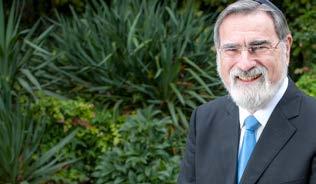
Benjy Singer
I interviewed Mr. Alan Sacks about his older brother, Rabbi Jonathan Sacks, about his memories and reflections.
1) What do you miss most about your brother?
Rabbi Sacks and I were very close. What I miss most is the fact that I can no longer speak to him, or correspond with him on issues (social, moral, religious) that trouble me. And then, every so often to have fun with him, discussing music or film, which were very dear to his heart.
I never left a conversation with my brother without feeling somehow emo tionally uplifted. In semi-humour, I could say that if I was feeling depressed about some state of affairs in the world, religious or otherwise, I could always feel reassured by the fact that my brother was even more depressed on the subject.
My brother had such a clear way of explaining issues of concern or contem porary relevance (that is of course why he was such a favorite of the BBC, the London Times and many other broadcasting outlets) that I left our discussions better able to face
the world.
2) Do you think Rabbi Sacks wanted to be a chief rabbi when he was younger?
As a teenager, I do not think that Rabbi Sacks had any dream of being a philosopher or a Rabbi. He was very interested in politics and debating and had originally planned to study Economics at University. The idea of philosophy came about when he was at Cambridge and the idea of pursuing a rabbinical career came later still.
His Jewish awakening was sparked (as it was for many) at around the time of the Six Day War, when Rabbi Sacks was at Cambridge University. And the story of his meeting with the Lubavicher Rebbe has been well publicised.
3) For you, what were the key charac teristics of Rabbi Sacks?
There are too many character traits to remember here: Giant intellect. Master of Torah and Western culture, and an ability to view Western culture through the lens of Torah.
Enthusiasm. Sense of humour. Constant encouragement of others. Willingness to let others take the limelight. Endless pursuit of knowledge – the breadth of subjects that my brother studied was quite remarkable. If he had to speak with people from a particular field of activ ity or study, or if he had to lecture or write
58 TORAH TIDBITS 1492 / CHAYEI SARA 5783
on a subject, he wanted to know as much (or as much as possible) on that particu lar subject as those he was meeting with. These might be social workers, politicians, scientists, economists, politicians, religious leaders of other faiths, and so on.
4) What drove Rabbi Sacks?
Rabbi Sacks was quite remarkable in wanting each person with whom he came into contact to achieve his or her full potential. He was never condescending or patronising. For example, he always wanted to know from my children what they were doing, what they were studying.
Rabbi Sacks had an unparalleled ability to make those who listened to him or read him feel more intelligent than when they began listening or reading.
My brother would ask me regularly “What should I be doing next?” Always look ing for ways to influence Jews and non-Jews to look for a higher moral principle, and not be self-centred.
Rabbi Sacks was never “superior”. He acted always with utmost dignity (even in private) and never suggested any superior ity for himself over others or for the Jewish religion over other religions. He spoke a par ticular Jewish language that had universal appeal.
One thing that was unique about Rabbi Sacks as a Rabbi was the following. I have never encountered any rabbinical figure who at every possible opportunity singled out his wife for special mention and special
praise.
Rabbi Sacks was a Rabbi of “today”. He explained why the Torah was relevant for issues of today which on their face had nothing to do with religion or philosophy and helped countless people from every background, Jewish or otherwise, religious or secular, to understand and cope with the morally or emotionally challenging prob lems of today.
5) Do you think Rabbi Sacks was a real Zionist?
Even though I have lived in Israel for forty years and have six children who served in the IDF, I always maintain that Rabbi Sacks was a greater Zionist than I am.
I think that there is no doubt about Rabbi Sacks’ stance on Zionism and living in Israel. Rabbi Sacks was perhaps the greatest ambassador for the State of Israel in the world. Rabbi Sacks saw Israel as the living heartbeat of the Jewish people and encouraged anyone and everyone to live in Israel.
If Rabbi Sacks were here today, in the State of Israel, I have no doubt that would be his message:
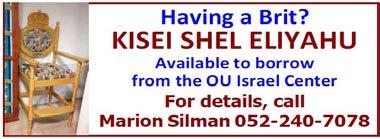
Do not deny the Other. Do not label the Other. Do not delegitimize the Other.
Do not attempt to cancel the Other.
Make your argument, listen to the other side’s argument, discuss, find a compromise, and move on together for the greater good. donated by Marion & Michael Silman Ita Rochel 02-560-9125
Benjy Singer is a teacher and freelance writer and journalist. He also runs the IsraelB.org online community, an online portal, which provides useful information of events, shi urim and news for olim and Jews around the world.
OU ISRAEL CENTER 59
MENACHEM
BY MENACHEM PERSOFF Special Projects Consultant, OU Israel Center menpmp@gmail.com
To Whom Does the Legacy Belong?
In our Parsha, the Torah recalls that after Sarah’s passing and Yitzchak’s marriage to Rivka, Avraham again took a wife, and her name was Keturah, who bore him six children.
But who is Keturah? And why did Avraham marry her in his old age at that particular time?

For Rashi, Keturah is Hagar, an Egyptian woman (Bereishit 25:12) and daughter of Pharoah. She had been Sarah’s handmaid and Avraham’s concubine who, at Sarah’s bidding, consorted with Avraham and gave birth to Yishmael. But also, at Sarah’s bidding – and Hashem’s instruction to Avraham to lis ten to his wife – was sent away on account of Yishmael’s insolent attitude and her lack of deference to the barren Sarah.
Rashi, however, adds that the handmaid was called Keturah because her deeds were as sweet as incense (Ketoret). Furthermore, her name also means “closed,” implying that Hagar did not give herself to any other man after her dismissal from Avraham’s household.
Why, then, was a concubine who left in disgrace considered as sweet as incense?
The Midrash indicates that when the derisive concubine was abandoned with her son Yish mael in the desert, she was overwhelmed that an angel spoke with her. Moreover, she was led to a well, able to survive. At that point, Keturah did Teshuva and was clearly suitable to return to her former husband.
The timing of Avraham’s reunion was interesting. Our rabbis taught that a widower should not remarry if he has grown, unmar ried children (Bereshit Rabbah 60:16). But Avraham, it appears, was concerned with diligently observing the original command to humanity to “be fruitful and multiply” (ibid, 61:3). Consequently, he waited until Yitzchak brought Rivka into his mother Sar ah’s tent. Furthermore, Rashi indicates that it was Yitzchak who sought out Hagar and brought her back to his elderly father (Rashi, Bereishit, 24:62). What beautiful “Kibbud Av Va ‘em!”
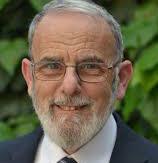
Later, we are told that Avraham gave all he had to Yitzchak – material items, blessings, and the legacy of his traditions (Bereishit 25:56). But even though the offspring of the union with the (sweet) Keturah were “blessed” to become chieftains of many nations, “to the sons of his concubines [including HagarKeturah], whom Avraham had, Avraham gave gifts and sent them away from Yitzchak, his son” (ibid. 6:6).
So much for the declarations of “Yishmael” that they, too, have a claim on our land!
Shabbat Shalom.
60 TORAH TIDBITS 1492 / CHAYEI SARA 5783
DIVREI
Celebrating 21 years on stage
Performances:
Heichal Hatarbut Gush Etzion : November 27th and 30th

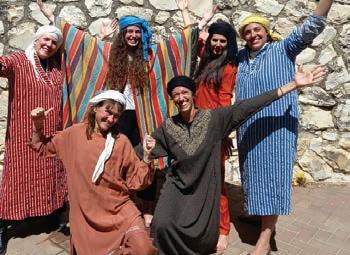




Shalva Auditorium - Jerusalem: December 4th and 7th
Heichal Hatarbut Bet Shemesh : December 11th


By Women For Women
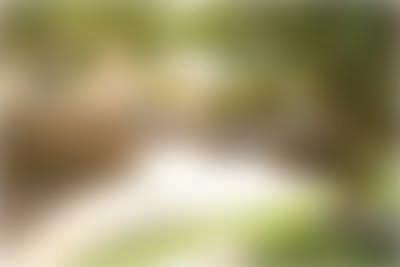
In English with Hebrew surtitles by Ehud Manor
For tickets: www.raiseyourspirits.org Group orders/info call: 0528651766 / 0528838839
Director: Toby Klein Greenwald Music Director: Elisheva Naomi Savir Choreographer: Maayan Allen
With the support and encouragement of the Matanel Foundation www.matanel.org
Presents By arrangement with the Really Useful Company Ltd Lyrics by Tim Rice, Music by Andrew Lloyd Webber and of the Foundation It’s never too late to help the needy! We receive heartbreaking requests daily Now, you can contribute to this Chesed Fund in various ways:
• Please assign checks to YESH EZRA and send them to Yesh Ezra, POB 36156, Romema, Jerusalem
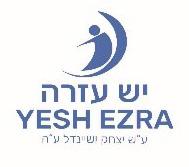
• Enter the Website at www.yeshezra.org and follow the instructions for $ and NIS contributions.
• Call Sara at 077-820-0196, SundayThursday, 10:00 am-3:00 pm, to donate with a credit card. Thank you! Inquiries or bank transfers: Menachem Persoff menpmp@gmail.com 050-570-1067
OU ISRAEL CENTER 61
JOSEPH and the Amazing Technicolor Dreamcoat
Why ‘A Land of Milk and Honey?’
The connection between ‘a Land flowing with milk and honey’ and the promise [of the Land] to the forefathers is intentional. For a lowly nation there is no need for an expansive life, and it [actually] can be harmful. When life is inundated with blessing one may be inclined to “sleep in the lap of laziness,” [in this circumstance] there is no need to be roused, or [even worse] brings one to a cor rupt way of life.
However, a nation that is exalted and is a holy people, it is most fitting that they live a life of expansion of the mind, not by bread alone, rather, with God’s bountiful blessings. A life of pleasures which one engages in order to uplift the soul, this exalts the nation. Therefore, a sign of the noble quality of the nation, which the (nation) will ultimately attain, comes the promise that her Land will be blessed with bounty, ‘a Land flowing with milk and honey.’ And with this sign the forefathers were given tidings that among them will be people of lofty heights, namely, that spiritual blessing will be nourished through a life of serenity and comfort. (Eretz Chefetz 1:9)
Rav Kook, in the exquisite excerpt above, offers a unique perspective why the Land

of Israel is accentuated by the honorific “flowing with milk and honey.” Rav Kook asserts that for other nations an abundance of material amenities will inevitably be distracting and potentially harmful to its character and aspirations. This is not so for the Jewish nation dwelling in Land. When the nation of Israel is spiritually sound, access to physical amenities actually serve to enhance their noble aspirations. In such an ideal state of perfection, positive values do not impede on one another but rather enhance one another.
Therefore, the promise of a Land flowing with milk and honey, which was first stated to Moshe standing at the burning bush and repeated an additional thirteen times throughout the Torah, reflects the virtuousness of a nation that is destined to achieve eminence when settled in their Homeland.
It is striking that Rav Kook develops a related theme in his commentary on the Haggadah regarding the unusual step of the seder of Karpas (eating the greens). According to the Talmud, vegetables before their meal were reserved for the wealthy. ‘A student who does not have much bread, should not eat vegetables because they whet the appetite’ (Shabbat 140b). A spiritual nov ice not far along the way will restrict his diet in an attempt to live a life of asceticism and purity. However, the Jewish nation aspires to reach the height of perfection, a state of divine harmony. It is an expansive state of
62 TORAH TIDBITS 1492 / CHAYEI SARA 5783
RABBI AARON
Editor, Torah Tidbits
GOLDSCHEIDER
consciousness alluded to by the verse such as, “Without walls shall Jerusalem be inhab ited” (Zechariah 2:8).
In other words, one of the first rituals of the Seder is intended to communicate that the ultimate goal of the redemption from Egypt will be realized when we enter the Land of Israel. Specifically on our holy soil where we attain our spiritual perfection, the Jew partakes of all of its bounty in service to God. (See also Passover Haggadah Spring time of the World, Naor, pp. 22-24).
Rav Kook, who explains the phrase “A Land flowing with milk and honey,” in a spiritual sense, also observes the verse’s literal meaning. The Talmud tells the story of Rami bar Ezekiel who happened to B’nei Berak and saw the following scene enacted before his eyes. Goats were eating under the fig trees. Honey was dripping from the fig trees, whole milk was dripping from the udders of the she-goats. The honey from the figs mixed with the goats’ milk. He said this is the meaning of the verse concerning Eretz Yisrael, “a land flowing with milk and honey.” (Ketubot 111b)
Rav Kook cites the above passage in his commentary on the Haggadah’s description of the Sages who gathered in Rabbi Akiva's home for the Seder in Bnei Brak. Rav Kook suggested that these great sages were roused to learn through the night with loving verve as a result of witnessing first hand the prom ise of salvation from Egypt, “and I will bring you to the Land,” having been actualized and alive. (Haggadah Olat Reiyah, Mossad HaRav Kook 1963, p.33).
During Rav Kook’s fundraising mission to America in 1924 he carried with him pebbles from Eretz Yisrael, which he would sometimes
remove from his pocket and hold in his hand while conversing with people (‘Springtime of the World,’ Naor, p. 198, note #81).
Apparently, Rav Kook was unable to let a day pass in which he did not personally experience the intimate bond, the blessing and potency, which is inherent in every stone of “the Land of our yearnings.”
Be’er Tziporah a"h - Bottled Water Gemach
Walking down King George St. in Jerusalem and want a cold bottle of water?
Come help yourself to a bottle at 52 King George.
In loving memory of Yoni’s wife Tziporah a"h, a true Eishes Chayil, always full of chessed, kindness and laughter, and brought life and strength to so many people, that she touched! She was like Aron, who loved peace and pursued peace.

Yoni thanks Hashem for having the opportunity of having Tziporah in his life, to learn of her caring, patience and happiness, to overcome her challenges. May Tziporah's Neshama be a light onto the world, in a time of darkness, and may her Neshama shine to Gan Eden. Yoni misses Tziporah with tears in his eyes, as Hashem gave him a gift, a crown jewel, now he returns her to Hashem. With thanks and Toda. Love, Yoni
To help refill the supplysend tax deductible donations for Be’er Tziporah a"h Bottled Water Gemach to Chabad of RechaviaRabbi Yisroel Goldberg email
Rabbi@JerusalemChabad.org 02 800-1717
www.JerusalermChabad.org/DonateShekels
OU ISRAEL CENTER 63
בוט יכ
'הל ודוה
FROM THE VIRTUAL DESK OF THE OU VEBBE REBBE


RAV DANIEL MANN
Correcting Praise About Rain
Question: At a time of year when we do not mention rain in Shemoneh Esrei’s second beracha, the chazan started saying “Mashiv haruach …” People called out to him “morid hatal,” and right after he said “… hagashem,” he added “morid hatal” and continued. Was that valid?
Answer: One who says “morid hagashem” in the summer must go back (Shulchan Aruch, Orach Chayim 114:4), because we must not praise Hashem for rain when it is “a curse” (in Israel) (see Ta’anit 3b with Rashi). Although there are different opin ions among Rishonim what the gemara means by making him go back (see Morde chai, Ta’anit 612; Rambam, Tefilla 10:8), we pasken that it means going to the beginning of the beracha. (If he went on to the next beracha, then it is to the beginning of Shem oneh Esrei (Shulchan Aruch ibid.).)
There are two explanations of why to return to the beginning of the beracha.
1) The incorrect beracha was valueless, making starting again fundamentally necessary (Korban Netanel, Ta’anit 1:1).
2) If one continues, there is no way of showing that he regrets mentioning rain;
by going back and omitting it where it is mentioned, he shows he takes back men tioning it (Mordechai ibid.; Ma’adanei Yom Tov, Berachot 4:14). One apparent nafka mina is whether it is enough to go back to the words before the place to mention rain (rav l’hoshi’a), where he can omit rain this time but it is not a full redoing of the beracha. Indeed, the Chayei Adam (I,24:6) says that while it is proper to go back to the beginning, it suffices to go back to “rav l’hoshi’a.” Your case is likely another nafka mina for those (Sephardim, Chassidim, as well as Ashkenazim in Israel) who say morid hatal in the summer. Although dew is not “rain negating” (after all, we ask for it along with rain in Barech Aleinu in the winter), the fact that it is the formula for the summer can make it sufficiently clear that he regrets mentioning rain. Therefore, Tehilla L’dovid (114:4) says it suffices (at least b’dieved) for such people to say morid hatal instead of going back to the beginning of the beracha. In fact, the Be’ur Halacha (to 117:3) says that one who said v’ten tal u’matar (in the ostensibly parallel Barech Aleinu; Shevet Halevi (VI:16) says they are not comparable in our context) in the summer and went back to say “v’ten beracha” fixed the beracha. Possible sup port for the position that the beracha is not inherently flawed is the fact that one does not need to go back to the beginning of Shemoneh Esrei (see Pri Megadim, Eshel
64 TORAH TIDBITS 1492 / CHAYEI SARA 5783
The Orthodox Union - via its website - fields questions of all types in areas of kashrut, Jewish law and values. Some of them are answered by Eretz Hemdah, the Institute for Advanced Jewish Studies, Jerusalem, headed by Rav Yosef Carmel and Rav Moshe Ehrenreich, founded by HaRav Shaul Yisraeli zt”l, to prepare rabbanim and dayanim to serve the National Religious community in Israel and abroad. Ask the Rabbi is a joint venture of the OU, Yerushalayim Network, Eretz Hemdah... and OU Israel’s Torah Tidbits. Avraham 114:9).

Despite all of this, several Acharonim posit that if one only went back to “morid hatal,” he has not fulfilled his require ment. The Shevet Halevi (ibid.) says that going back, even right away, does not suffice to erase the damage done, and starting the beracha anew is necessary, and this is Ohr L’tzion’s (II:7:29) bottom line as well. L’horot Natan VI:6 questions some of our assumptions, such as that going back to the beginning requires the very first words, and that for those who say morid hatal it is an effective sign of retraction. Since there are formidable opinions on both sides, if one just added morid hatal and then finished the beracha, the mat ter is a doubt (Teshuvot V’hanhagot I:84). While generally it could be at least laud able to do another Shemoneh Esrei, with the intention that if it is unnecessary, it should be an optional tefilla (Shulchan Aruch, OC 107:1). One cannot use this ploy on Shabbat, as optional tefillot are not pos sible then (ibid.).
The above relates primarily to a mistake made in the silent Shemoneh Esrei. While fundamentally the same rules apply to chazarat hashatz (Mishna Berura 126:3), a few factors are impactful. It is a true tir cha d’tzibbura and embarrassment to the chazan to repeat chazarat hashatz because of the improperly corrected mistake. Addi tionally, since you describe the people
Baka: 5-room garden apartment, 140m, master suite, private parking, storage, full of light and airy, nice garden, 5,250,000 NIS
Old Katamon: Spacious 3 room apartment in a very quiet street, 75 sqm, sukkah balcony facing a green and pastoral view, 3 exp. Shabbat elevator, private parking storeroom, 2,690,000 NIS

Baka: 5-room apartment, 130m, balcony, Shabbat elevator, huge storage, private parking, 5,100,000 NIS
The Greek Colony: 4-room apartment, 85m, balcony, green open view, elevator, great location, needs renovation 3,200,000 NIS
Old Katamon: 4-room apartment, 95m, balcony, open view, Shabbat elevator, fully accessible, private parking, 3,290,000 NIS

Mekor Chaim: 4-room apartment, 90m, Sukka balcony, Shabbat elevator, fully accessible, 3,600,000 NIS
Arnona: 4 room brand new apartment, 90m, master suite, balcony, fully accessible, private parking, 3,150,000 NIS
Ramat Sharet: nice 5-room apartment, 120m, full of light, spacious living room and bedrooms, big storage, small sukkah balcony, double parking, 3,450,000 NIS
Having a dispute?
For a Din Torah in English or Hebrew contact ‘Eretz Hemdah - Gazit’ Rabbinical Court: 077215-8-215 • fax: (02) 537-9626 beitdin@eretzhemdah.org

OU ISRAEL CENTER 65
Meir
077-2050015 052-2678749 www.golan-realestate.net Meir
Old
calling out “morid hatal” as he started his mistake prompting the chazan to change course, it is clearer that he was taking back the mention of rain and one can rely on the opinions that morid hatal suffices.
Golan
Golan
Katamon: 4 room apartment in a small and quiet street, 101 sqm, renovated, very bright and airy, master bedroom, Safe room (mamad), sukkah balcony, view, elevator, 3,400,000 NIS Old Katamon: 4 room apartment, 90 sqm, well split, bright airy, sukkah balcony facing a magnificent panoramic view, 3 exp Shabbat elevator, parking, 3,290,000 NIS
TORAH VEHA'ARETZ

 INSTITUTE BY RABBI MOSHE BLOOM en.toraland.org.il
INSTITUTE BY RABBI MOSHE BLOOM en.toraland.org.il
When Is It Permissible To Buy Vegetables in the Eighth Year Without Knowing Their Shemitah Status? #1
I want to explain the table we presented last week.
Rambam (Shemitah 4:6-7) writes as follows: Until when are the sefichin of the Sabbatical year forbidden in the eighth year? … They should not be pur chased in the eighth year until produce of that size could have grown in the eighth year. When, in the eighth year, the produce which grows rapidly reaches [the size of the produce which grew in the Sabbatical year], the prohibition is lifted from the produce that remains.” Why is this so? (see Shabbat Ha’aretz IV 7:2)
1. Relying on the fact that it may have been planted after shemitah Chazal forbid only crops that are definitely sefichin. In cases where the vegetable may or may not be sefichin, if there are already ripe crops of a similar type available, it is possible to rely on the possibility that it is permissible. This is even though the per missible produce is the minority and the majority is still forbidden.
2. When the permissible part exceeds
the forbidden part in the vegetable itself
A vegetable that was planted during shemitah, continued to grow during the eighth year, and was then harvested: the forbid den part of the vegetables (that grew during shemitah) is nullified by the permitted part (that grew during the eighth year). Fur thermore, even though the vegetable was definitely planted during shemitah, Chazal did not forbid it at a certain point in the eighth year.
3. We are not concerned that someone will plant clandestinely in the eighth year
Chazal were not concerned that people would plant in their fields during shemitah for the eighth year if they have a permissi ble alternative.
Rambam continues (4:7), citing the words of Rebbi in the Mishnah (Shevi’it 6:4): “And it is permissible to take a vegetable imme diately following the seventh year.” The accepted explanation for this is vegetables that grow quickly within several days.
More next week.
66 TORAH TIDBITS 1492 / CHAYEI SARA 5783







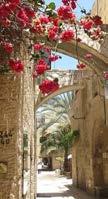






OU ISRAEL CENTER 67 Frustrated by not finding the right place in Jerusalem? Need advice navigating the current Israeli market? Confused about the differences between Jerusalem neighborhoods? Unclear about the laws of buying a place in Israel? Let us help answer all your real estate questions! Over 30 combined years of experience in buying and selling homes. Our goal is customer focused service to help you find your home in Israel. HOW DO WE HELP THOSE WE LOVE WHO ARE SUFFERING FROM SUBSTANCE ABUSE AND ADDICTION? Yaacov Rosedale, LPC, NCC, CASAP Licensed Clinical Mental Health Counselor 052-808-4406 | yaacovmr@gmail.com Together we will develop a relapse prevention plan, keeping the individual’s needs & lifestyle in mind. Jewish QuarterXL Duplex apartment135 meters, 3 bedroom, 2 bath, new kitchen, 5 minutes from Hurva square & Mamilla Alon ShevutXXL Free standing home, 380 meters, 3 floors, Great location, surrounded by green Benjie Aziz Real Estate BENJIE 0544-882194 BENJIE@BEZEQINT.NET For Sale
WEITZMAN
Future Fertility
Last time we presented the question as to whether a couple who get married in their mid-thirties should try to get pregnant immediately or should undergo fertility treatment in order to freeze embryos and extend their fertility.
On the one hand, it could be claimed that this is a distasteful suggestion, and should be condemned. If we believe, as religious Jews, that God has a hand in history and has empowered human beings to invent and develop fertility treatment, we can ask what is His desire? Is the Divine purpose of fertil ity treatment to enable couples facing fertility challenges to have children. These difficult procedures do not exist in order to allow any one to have as many children as they desire.

But on the other hand, who are we to make such a decision? If God did allow fer tility treatment to exist then why can they not be accessed by everyone who desires to use them? The treatments are expen sive and uncomfortable, and if a couple are willing to undergo these difficult pro cedures in order to have more children, can we, or even society, prevent them from doing so? Society can choose not to pay for such treatments, but can society choose to disallow a couple to pay for and undergo
their own treatment?
On one hand, the couple’s desire to have more children is perfectly understandable, and they are willing to go to great lengths to fulfill their yearning and not limit the size of their family. On the other hand, in order to freeze embryos the couple will have to push off having children, and opt for undergoing in-vitro fertilization a sufficient number of times to produce the required number of embryos. The best method of produc ing a pregnancy for most people in their mid-thirties would be trying to get preg nant naturally, without fertility treatment. The couple’s desire to freeze embryos for later children may be a detrimental factor in achieving a pregnancy at all.
For most couples starting to have a family at that age they will be able to have children, and such couples will have an average of three children. The pursuit of fertility treat ment, in such a case, attempts to ensure that there will be a fourth and fifth child. Should a couple compromise their chances of get ting pregnant now in order to increase the chances of having a larger family later?
More on this next time.
The Puah Institute is based in Jerusalem and helps couples from all over the world who are experiencing fertility problems. Offices in Jerusalem, New York, Los Ange les & Paris. Contact (Isr) 02-651-5050 (US) 718-336-0603 www.puahonline.org
68 TORAH TIDBITS 1492 / CHAYEI SARA 5783
RABBI GIDEON
Machon Puah for Fertility and Gynecology in Accordance with Halacha
Rabbi Zemel served as the mora de'atra of the Talpiot, Jeruslaem community for half a century. We are honored to share in the pages of Torah Tidbits a few words of hesped after his recent passing.
HaGaon,
HaRav Chaim Yehoshua Zemel
zt"l (1945-2022)
Rav Zemel, ל”צז , was the Founding Rabbi of Beit Knesset Shai Agnon, and Mora D’Asra of the Talpiot-Arnona Community in Jerusalem from 1972-2022, until his unforeseen and cataclysmic הריטפ on November 5, 2022, 12 MarCheshvan, the exact same tragic Yahrzeit date of his beloved married daughter, Rochel Roth, in 1995.
Rav Zemel had a uniquely paternal, insightful and dedicated relationship with the myriads of residents, both םייתדו םינוליח of this community, as well as the several hundred families of the Shai Agnon Shul.


From only a sampling of his many attributes: Rav Zemel’s Shiurim were captivating while encouraging full audience participation, the Rav’s recital of הליענ תליפת was beyond comparison, and the Rav’s exceptional ability to quote verbatim ם”במר ,ס”שו ךורע ןחלש
Rav Zemel will be heartbrokenly missed, and leaves behind an illustrious Rabanit and noble daughters, gifted Rabbinic children and sons-in-law, and many cherished grand- and great-grandchildren. ה”בצנת
OU ISRAEL CENTER 69
OU ISRAEL
PARENTING COLUMN

Dear OU parenting, My 10-year-old son is very inde pendent and goes to friends, the makolet, and after-school activities by himself. I worry about keeping him safe in general and specifically from predators/abusers. Do you have any advice that can calm my fears? A.K.
Michal Silverstein, MS Dear A.K.

We all want to keep our children safe and, with that, we want them to lead full, independent lives. So how is a parent supposed to resolve these two seemingly contradictory ideals?
I would begin by having some conversa tions with the child about safety and setting clear boundaries. It is all too easy to forget in this country that although children are given a lot of independence, they are still children. Parents still should provide supervision and children must be accountable. Parents should know where their child is going, who he will be with, and when he will be home. If he is going to a friend’s house, parents should know if a responsible adult will be present and how to reach that person by phone. If your child is reluctant to share any information, you should explore why. If you build healthy communication and
trust now, it will serve you well as your child becomes increasingly more independent. Talking about general safety consists of multiple conversations, not speeches. You also mentioned how fearful you are about his safety. Although it is a valid concern, children will pick up on their parent’s anxi ety and either become anxious or rebel and not share with their parent to avoid causing them stress. It’s very important that when you discuss safety with your child you project calm with a touch of seriousness. If you are too preoccupied with your fear and anxiety, it may overpower your ability to actually keep him safe by sabotaging the whole conversation.

In regards to keeping your child safe from predators or abusive situations, take 4 main principles into account:
1) No secrets from parents - Share with your child that if someone tells him that he must keep a secret from his parents, it’s a red flag and he must tell you right away.
2) My body belongs to me - Just as he is not supposed to touch others in private areas no one else should touch him there either.
3) No one should make you feel uncomfortable - Teach your child to trust his instincts. Tell him that he knows when something
70 TORAH TIDBITS 1492 / CHAYEI SARA 5783
feels uncomfortable to him. A good touch will make a child feel secure, cared for, and happy and a bad touch makes a child feel threatened or violated.
4) Saying “no” - Your child has the right to say NO, even to an adult, if he feels uncomfortable.
When you discuss these points with your child, be sure to give examples and scenar ios to make them more relevant.
In most cases, abuse doesn’t come out of the blue. There is usually a grooming period. If your child can let you know when someone treats him in an unacceptable way, it’s possi ble to prevent a situation from deteriorating.
You can go over these guidelines many times with your child, but unless you have a trusting relationship, your child may not come and tell you when he’s concerned. The most important part of protecting your child and keeping him safe, now and through the teenage years, is to develop a relationship in which your child can tell you ANYTHING! This type of relationship is cultivated from a young age so be mindful of how you react to your child when he confides in you. Are you attentive? Do you overreact? Do you yell? As long as your child knows that you will listen and support him, he will feel comfortable coming to you if he’s hurt, confused, or over whelmed. And that is the ultimate goal.
Michal Silverstein has a MS in educational psychology and counseling. She facilitates parenting workshops in and around Jerusa lem and maintains a private practice.
Feel free to send in any parenting questions you may have to parenting@ouisrael.org (Details will be changed to preserve anonymity).

OU ISRAEL CENTER 71

72 TORAH TIDBITS 1492 / CHAYEI SARA 5783

OU ISRAEL CENTER 73
Sharing the Positive
“Shalom Sivan, my name is Chaim Nachman Kowalsky. I am privileged to teach in the Ort Pelech Banim school in Jerusalem. This year the principal, Yossi Hershkov itz, introduced something amazing: an app called “nekuda tova” (good point). Each teacher devotes a few minutes each day to writing good points about several students and the app immediately sends them as a gift -- made more precious with emotive graphics -- to the students and their parents.
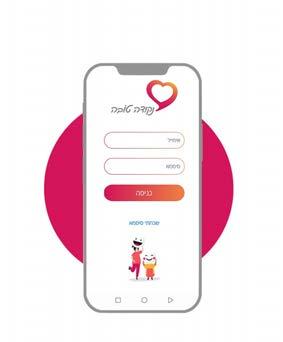
It’s impossible to describe the positive spirit that this little innovation has brought to the school and how it has influenced the relationships between teachers and stu dents and their parents. Generally, when a school contacts parents, parents ask themselves ‘What happened this time?’ Now they are made aware in the mid dle of the day that their child excelled in physics class or helped another student during break. When the student returns home, their parents already know about their good points for that day and we, the
teachers, appreciate that we are not only preoccupied with criticism, but with compliments too.
There is a lot of talk about the dangers of shaming and lashon hara (insulting or derogatory speech), but not much dis cussion about the obligation to increase uplifting speech and positive reinforcement. With this change in emphasis, there would no longer be any room for negative speech. As the Hasidim say: Darkness is not chased away with sticks, but pushed away with a little light.”
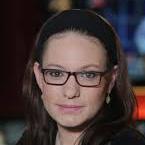
photo: https://www.goodpoint-il.info/
Old Katamon (Palmach)3 rms, charming, pleasant, wellmaintained, 2 Sukkah balconies, prime location! Exclusive! Tovi: 053-6268110
Old Katamon (Hamatzor)6 room apartment,1st floor, arab-style house, Sukkah terrace, Shteiblach building. Exclusive! Anita 053-6318355 • Tovi 053-6268110
Old Katamon (Nakdimon) - Charming 7 rm duplex, 1st floor, amazing roof terrace, great views, option to purchase 2 rm adjacent apt. Exclusive! Tovi: 053-6268110 • Anita 053-6318355
3 Moshe Hess St., Jerusalem 0778038511
74 TORAH TIDBITS 1492 / CHAYEI SARA 5783 THE DAILY
PORTION BY SIVAN RAHAV-MEIR
JERUSALEM REAL ESTATE
SAXON-JERUSALEM ISRAEL’S LEADING REAL ESTATE NETWORK
ANGLO-








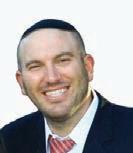

OU ISRAEL CENTER 75 Scan to visit our site www.noamhomes.com Real Estate | Investments | Management services www.noamhomes.com | office@noamhomes.com Look for us: NOAM HOMES Noam Homes Even Sapir 24, Jerusalem 058-793-2222 BS″D Scan to visit our site www.noamhomes.com Real Estate | Investments | Management services www.noamhomes.com | office@noamhomes.com Look for us: NOAM HOMES Noam Homes Even Sapir 24, Jerusalem 058-793-2222 2020 2021 From your friends at NOAM HOMES Real Estate Professionals The TOP 10 Real Estate Office in Jerusalem for 2020 & 2021 (MADLAN) HAPPY Passover NACHLAOT Great Investment Property, devided into 3 units! Beautiful 5 room duplex, built to a high standard! Lot with unique villa with Apartment Complex and private garden! Authentic 5.5 room Home with character and beauty! MALCHA NACHALAT ACHIM GERMAN COLONY Noam Homes BS″D WE APPRECIATE YOU COMING TO BROOKLYN AND TEANECK THIS WEEK TO HEAR ABOUT REAL ESTATE IN ISRAEL. NEXT WEEK, WE'LL GET TOGETHER ONCE AGAIN WITH OUR CLIENTS AND OUR FANTASTIC PROPERTIES IN MIAMI AND MEXICO! LOOKING TO BUY/SELL A PROPERTY IN ISRAEL? We will help you! NOAM HOMES is a boutique real estate agency. The firm was established by Noam Vasl, a senior real estate consultant with expertise and extensive experience in marketing, managing, and selling real estate in Jerusalem and the surrounding areas. Noam Homes is taking its exclusive properties abroad! Noam Vasl Owner & Real Estate Agent +972-52-848-7391 Noa Vasl Real Estate Agent +972-52-870-2387 NEW YORK Sun, Nov 13 2022 10:30-18:00 Brooklyn, NY NEW JERSEY Tues, Nov 15 2022 16:30-21:30 Teaneck, NJ MIAMI Sun, Nov 20 2022 10:30-18:00 Aventura, FL MEXICO Tues, Nov 22 2022 14:00-21:30 Mexico City Book a meeting TODAY to see how we can assist you in the process of selling your home to the right buyers at the right price: MIAMI: NE 210 th Street Aventura, FL 2801 Sun, Nov 20 2022 - 10:30-18:00 MÉXICO: AQUA HOTEL - Av. Paseo de los Tamarindos No.98 Col, Bosque de las Lomas, 05120 Ciudad de México Tues, Nov 22 2022 - 14:00-21:30
TORAH 4 TEENS
BY TEENS NCSY ISRAEL


Ahava Goldgrab Raanana Chapter Madricha
Age: Nothing More than a Number?
The Parsha begins by telling us how long Sarah Imeinu lived “הָנָׁש הָאֵמ הָרָׂש יֵּיַח ּויְהִּיַו
עַבֶׁשְו הָנָׁש םיִרְׂשֶעְו …” What’s interest ing here, is the Torah’s separation of the years: one hundred years, twenty years, and seven years. We see that this style of writing is not typical in other places in the Tanach; even just a few prakim earlier, it’s written, “הָנָׁש עַׁש ֵתָו םי ִעְׁשִּת־ןֶּב ם ָהָרְב ַאְו …”. This unusual wording in our parsha seems to indicate that the Torah wishes to emphasize that Sarah’s age is very significant.
Rashi explains the special treatment- Sar ah’s years are comparable to each other. At 100, Sarah was as righteous as she was at 20, still welcoming strangers into her home and acting as the mother of a new nation. At age 20, she was beautiful and innocent as when she was 7.
Sarah Imeinu never fully left any stage of her life behind, so to speak. She held onto the positive parts of her youthful per sonality and kept growing, adding more depth.
According to our mesorah, Sarah was the first person to make a tikun in some way for the sin of Chava in Gan Eden. Sarah achieved this by leading a life filled

with happiness. Whereas Chava was told that she will bring children into the world through pain and suffering, Sarah named her son after joy and laughter. Chava distanced mankind from HaShem, whereas Sarah strived to inform her followers of HaShem’s divine presence.

Perhaps the reason that Sarah’s years are detailed in our parsha is to show how she fully lived each chapter, completed each aspect of a life well lived, and perhaps even completed HaShem’s original goal for creation.
Shua Golubtchik 11th Grade, Raanana Thanksgiving
In this week’s parsha, Chayei Sara, the Torah tells of the purchase of תרעמ הלפכמהand Eliezer’s quest for a wife for Yitzchak. In between the two stories the Torah tells us, “־תֶא ְךַרֵּב ’הַֽו םי ִמָּיַּב
׃לֹּֽכַּב םָהָרְבַא ,” “and Avraham was old and advanced in years, and Hashem blessed Avraham with everything.” Despite this incredible blessing, the Torah seems to jump to a new story without any further attention to Avraham’s reaction. In con trast, whilst Eliezer is looking for a wife for Isaac, he finds Rivkah with G-d’s help and in response prostates himself before Hashem immediately.
I think the Torah’s response to this
76 TORAH TIDBITS 1492 / CHAYEI SARA 5783
א ָּב ן ֵקָז ם ָהָרְבַאְו
םיִנָׁש
discrepancy can be found in a close examination of Avraham’s speech when he sends his servant on a quest to find a wife for Yitzchak. Avraham makes Eliezer swear to him that he will find a wife among his father’s family using the language “־ְׁשַאְו ץֶרָאָה יקֹל-אֵֽו םִי ַמָּׁשַה יקֹל-ֱא ’הַּֽב ָךֲעי ִּב ”. “I will make you swear by G-d, G-d of the Heavens and G-d of the Earth.” But, a few verses later Avraham says, “תיֵּבִמ יִנ ַחָקְל ר ֶׁשֲא םִי ַמָּׁשַה יקֹל-ֱא ’ה יִבָא”. “G-d, the G-d of the Heavens, who took me from my father’s house”
Rashi asks why during the second ref erence to G-d, Avraham doesn’t say “G-d of the earth”. He explains that originally, when Avraham left his father’s house, no one knew about G-d on earth. Avraham therefore spread the Torah of Hashem and encouraged the recognition of G-d. Now, at this point in time, Hashem is recognized not only in the heavens, but also by mankind. In contrast to Avraham, we see Eliezer, Avraham’s servant, asking G-d for help finding a woman for Yitzchak, and then once he finds Rivkah, he immediately bows before Hashem. Despite Eliezer thanking Hashem, he’s still not even named in our parsha and remains a background charac ter throughout the Torah. Perhaps we can learn from this that thanking Hashem is of course necessary and commendable, but if we really want to acknowledge Hashem’s blessings we should try our best to give back to Hashem whether by spreading G-d’s name or doing mitzvot.
NCSY Israel is the premier organization in Israel, dedicated to connect, inspire, empower teen olim to the Land of Israel by encouraging pas sionate Judaism through Torah and Tradition. Find out more at israel.ncsy.org
OU ISRAEL CENTER 77
לייא תולבוה ד״סב www.premiummoving.co.il MovingPackingStorage 053-7272-815 Shmitah Lechumra and Otzar Haaretz Produce! ORDER ONLINE AND GET THE PRODUCTS YOU PREFER DELIVERED STRAIGHT TO YOUR DOOR! ORDER TODAY AND ENJOY SUPERIOR QUALITY, SELECTION AND SERVICE! Use coupon code welcome2ftf and save 5% off your first order! www.FarmToFamily.co.il Netanel 050-344-6261 | Office 058-444-6260 American Service! American Products & Specialty Items! Are you tired of shlepping your groceries home? Flying Soon? Travel with Confidence 1UniTravel - Medical Insurance at great prices Choose from multiple options 1unitravel.brokersnexus.com 1UniSim - Sims for USA and Worldwide Starting at $40 sales@1unisim.com Call 077-400-3199 or USA 718-715-0001

78 TORAH TIDBITS 1492 / CHAYEI SARA 5783 www.israelrescue.org 1221 United Hatzalah’s network of 6,200 volunteer medics help save thousands of lives each year across Israel by providing medical treatment in an average response time of 3 minutes or less. UNITED HATZALAH WHEN SECONDS COUNT... UNITED HATZALAH IS THERE. UNITED HATZALAH
THE MOST SOUGHT AFTER LOCATION IN OLD KATAMON IN JERUSALEM


OU ISRAEL CENTER 79






















 OU Executive Vice President
OU Executive Vice President












































































































































































































































































 INSTITUTE BY RABBI MOSHE BLOOM en.toraland.org.il
INSTITUTE BY RABBI MOSHE BLOOM en.toraland.org.il




































